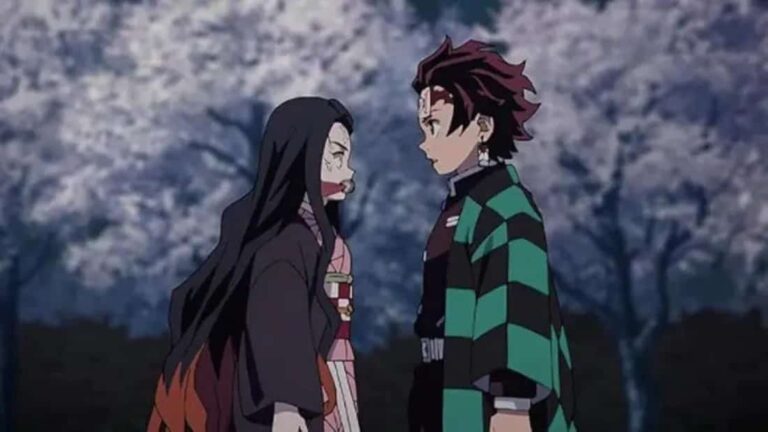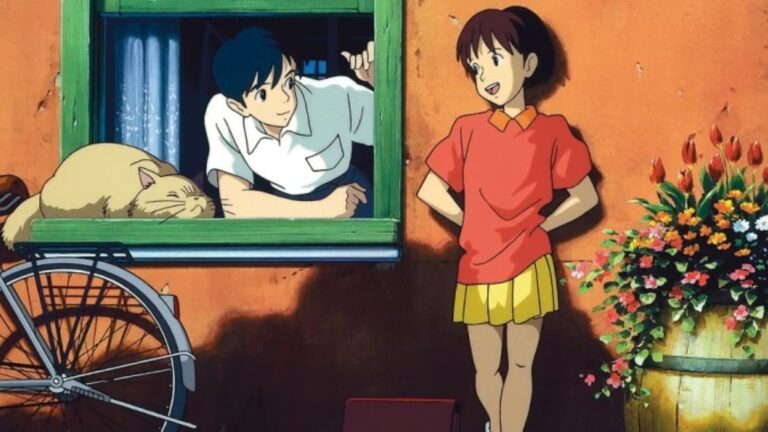Top 50 Most Popular African Movies To Watch In 2023
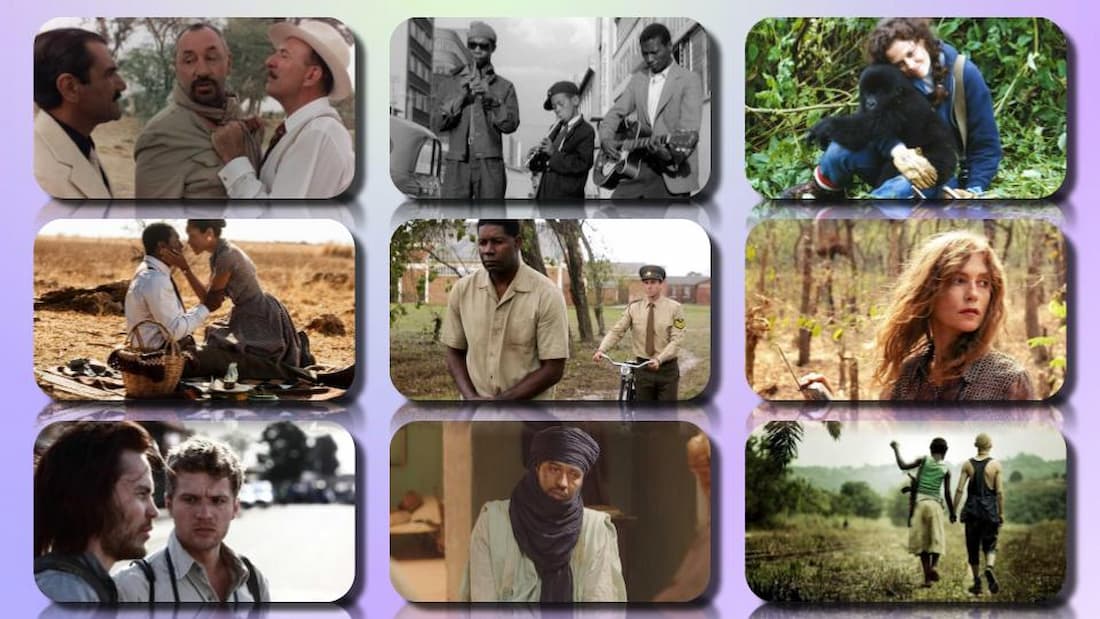
Africa is one of the most enigmatic lands on Earth. On one hand, the continent has biodiversity like no other continent, with deserts, rainforests, grasslands, mountain peaks, etc. It is also rich in soil, minerals, and fossil fuels.
However, it is the most war-torn, conflict-ridden continent with the biggest humanitarian crises. At the same time, we also get to hear the most heart-warming stories of human endurance and stories of triumph over obstacles from Africa.
Despite all the suffering, Africa has given us stories of courage, hope, human spirit, etc., that can inspire us all. They may be fictionalized accounts of struggle, real-life stories of leaders, historic battles, or simply funny adventure stories.
To throw light on life in Africa, we have many award-winning, acclaimed stories from African, Hollywood, and European filmmakers. ENTOIN has curated a list of 50 movies based on Africa for you to watch.
You might have watched some movies of these gems, but there are many rare gems among these stories that cannot be missed. So, here is the list of top films from Africa.
Recommended:
50. Mandela: Long Walk to Freedom (2013)
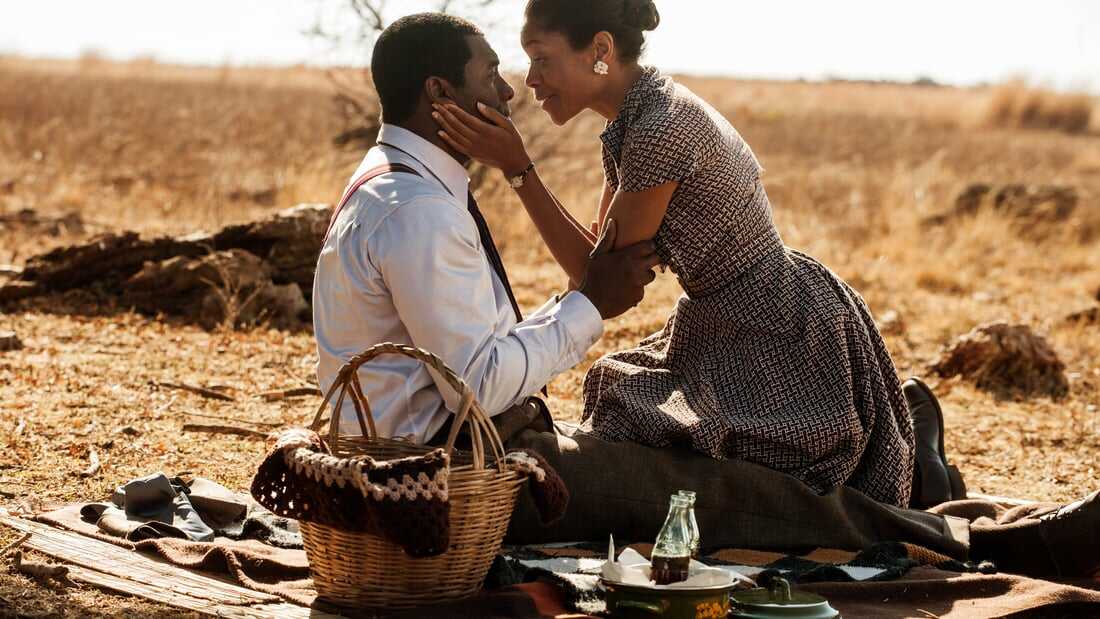
Mandela: Long Walk to Freedom is a biographical tale about the life and struggle of Nelson Mandela. Idris Elba portrayed the titular role in this South African-British film production. On the day of the London premiere of the film, Nelson Mandela sadly passed away.
The news was shared with the audience after the end credits rolled. The film tracks the progress of Mandela from a rural youth to a peaceful protester against the Apartheid regime.
As the peaceful protest failed, he made the difficult choice to take up armed protests and received a life sentence. However, the jail could not stop Nelson Mandela’s spirit from soaring.
He continued to motivate from within the jail while his wife, Winnie Mandela, worked outside and fought for freedom. The film received mixed reviews, but the performance of Idris Elba was highly praised,
Recommended:
49. Goodbye Bafana (2007)
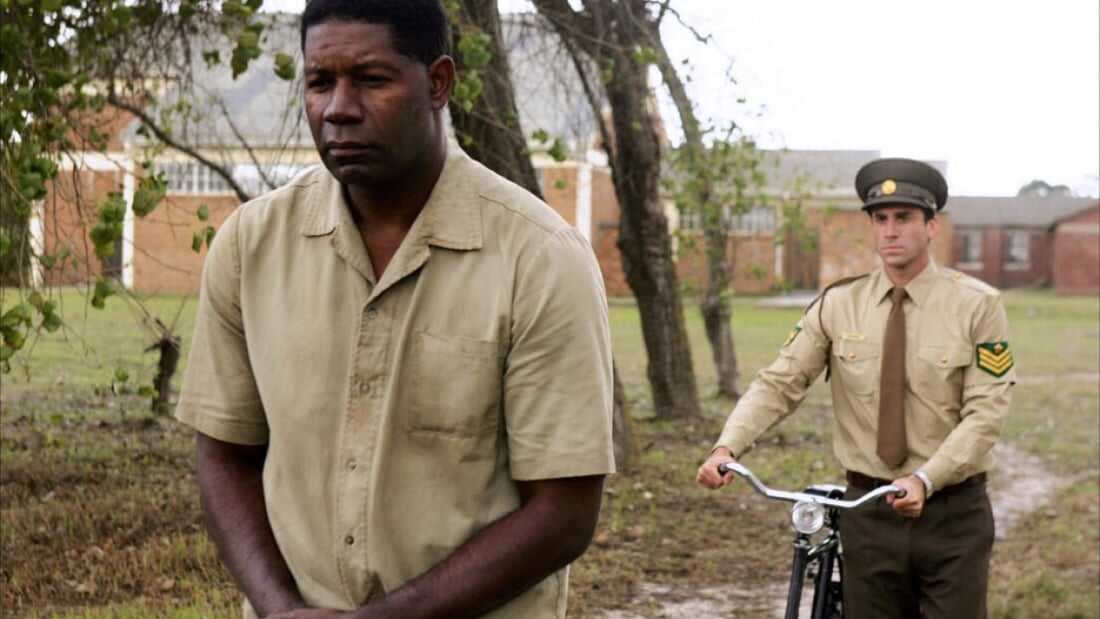
Goodbye Bafana is a biographical drama based on the memoir of James Gregory, the prison guard, and censure officer of Mandela. The film is based on the book Goodbye Bafana: Nelson Mandela, My Prisoner, My Friend by James Gregory.
Bafana means Boys in Xhosa. James Gregory is depicted as a Xhosa-speaking Caucasian who sympathized with the African freedom fighters. For this stance, Gregory faced a lot of hardships, threats, and pressure from the oppressive white regime.
He decided to become a censure officer and prison guard for Nelson Mandela so that he can spy on his charge. However, Mandela changed Gregory with his friendship. The account of Gregory has been disputed and criticized as historically inaccurate and a fabrication.
Recommended:
48. Come Back, Africa (1959)
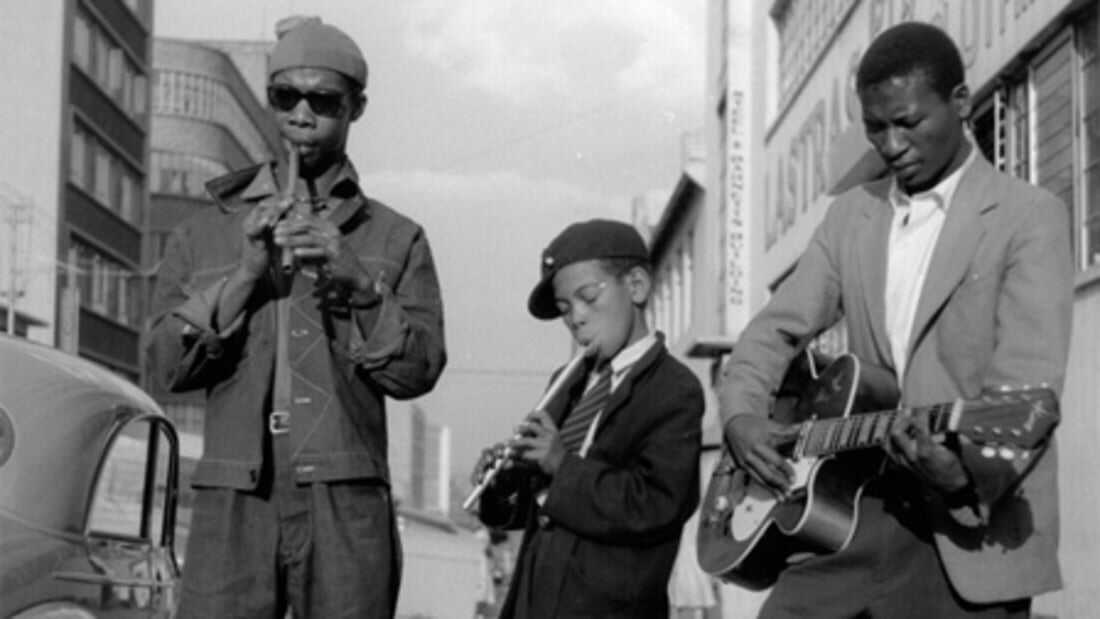
Come Back, Africa is an American drama about the life of a South African youth, Zachariah, during the Apartheid rule. The film received great praise for its documentary-style filmmaking, where real street people were used as performers in fictionalized situations.
The settings, locations, and responses were as natural and real-life as can be. The story follows Zachariah as he lives during the Apartheid rule and encounters racism, discrimination, and hardships that were commonplace in society.
The cast is a group of inexperienced street performers in situations that were scripted by Lionel Rogosin, the film’s director, producer, and writer. The film was praised as a journalistic piece of work that captured the societal structure in South Africa.
It is also revered in South Africa for enshrining the exact image of their towns and their people.
Recommended:
47. Gorillas in the Mist (1988)

Gorillas in the Mist is a drama based on the non-fiction book of the same name by Dian Fossey. The film is about the life’s work and research of Dian Fossey, who worked on gorillas in the Rwanda jungles.
Dian Fossey was an occupational therapist who was interested in primates after attending a seminar by Louis Leakey. She began her study of gorillas in the jungles of Rwanda as they were being poached vigorously.
The work of Dian Fossey was instrumental in increasing the population of gorillas in Rwanda and in reducing the tourism impact. The work of Dian Fossey was renowned across the world through the National Geographic channel and had another thesis work set to be published.
However, she was murdered, and her murderer has not been apprehended yet.
46. White Material (2009)
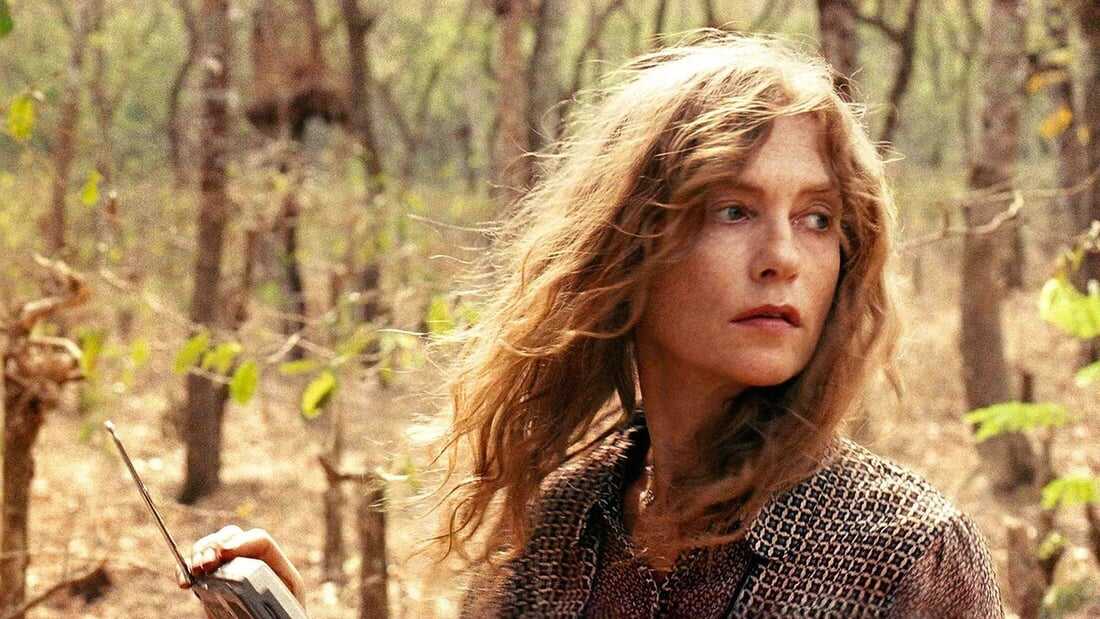
White Material is a French film co-written and directed by Claire Denis. The film won critical acclaim and became a major success of the year. Many critics and publications included the film in their list of best films of the year.
The film is set in an unnamed African country where French is spoken. The country is experiencing civil unrest, and many white folks are leaving the country. However, a lone French woman refuses to abandon her coffee plantation and decides to fight for her right.
Not only does she face racial discrimination, but many other abuses in her struggle. The film was made after the insistence of actress Isabelle Huppert to work with the acclaimed director Claire Denis.
The film was nominated for the Golden Lion at the 2009 Venice Film Festival.
45. Timbuktu (2014)
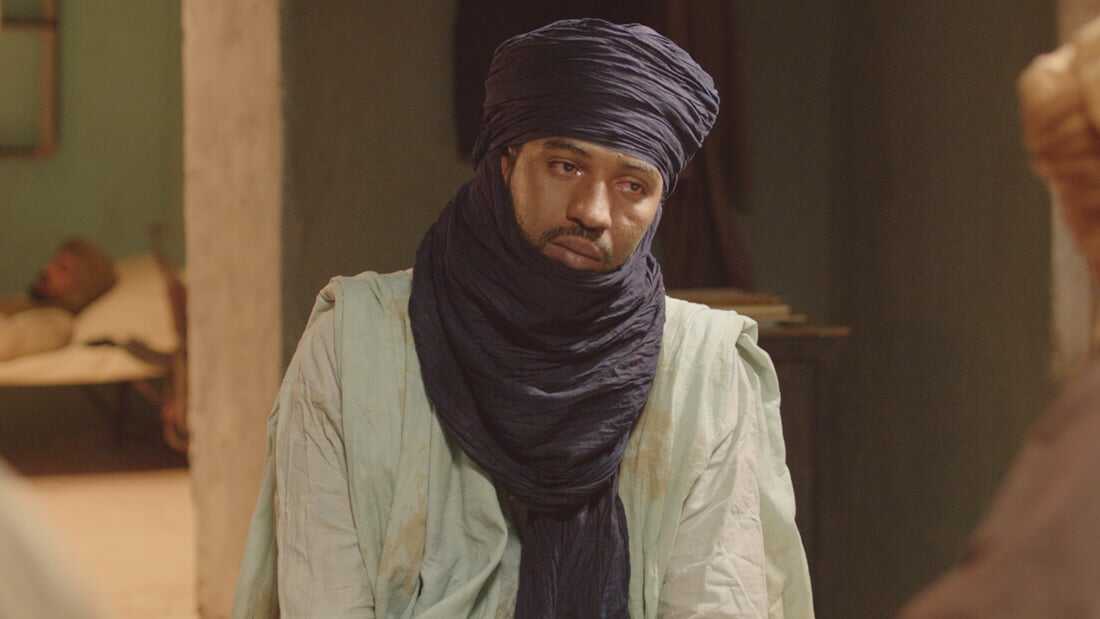
Timbuktu is a tragic Mauritanian-French drama film from the director Abderrahmane Sissako. The film was selected for the Palme d’Or at the 2014 Cannes Film Festival, where it went on to win the Prize of Ecumenical Jury and the François Chalais Prize.
The film is inspired by the jihadist occupation of Mali by Ansar Dine. Kidane and Satama are a married couple who live in the dunes of Timbuktu as cowherd. They live outside the town and are not impacted by the jihadist extremists who enforce the sharia law.
However, situations take a drastic turn, and Kidane and Satima get dragged into inescapable circumstances. The film was the first film shot in Mauritania and also the first film that was nominated for an Academy Award from the country.
44. War Witch (2012)
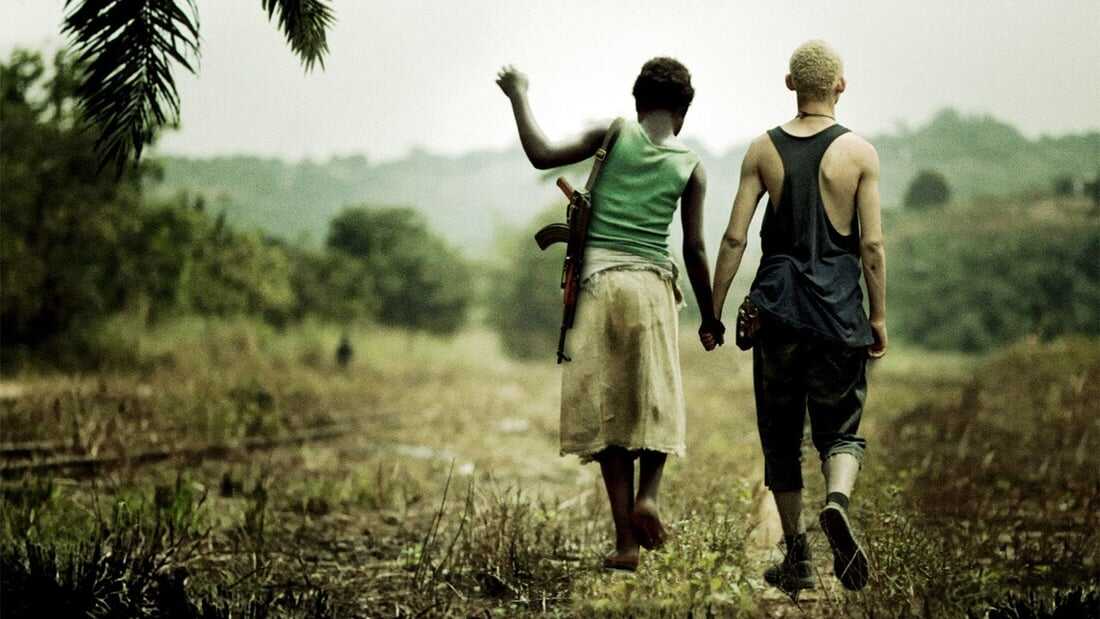
War Witch is a Canadian war drama shot in French and Lingala. It is written and directed by Kim Nguyen about child soldiers in the Democratic Republic of Congo. The film was Canada’s entry to Academy Awards, despite being shot mostly in Lingala and French.
The actress who played the protagonist, Rachel Mwanza, was a homeless girl in Kinshasa before this film. Komona is a 12-year-old girl living in her village in sub-Saharan Africa. She is abducted from her village along with many other children and sent to be trained as a rebel child soldier in Congo.
After an incident in the training field, Komona escapes an attack on the group while under the influence of tree sap. This convinces her captors that she is a witch and this makes her more valuable to the rebels. But will it make her life easy or difficult?
43. The Bang Bang Club (2010)
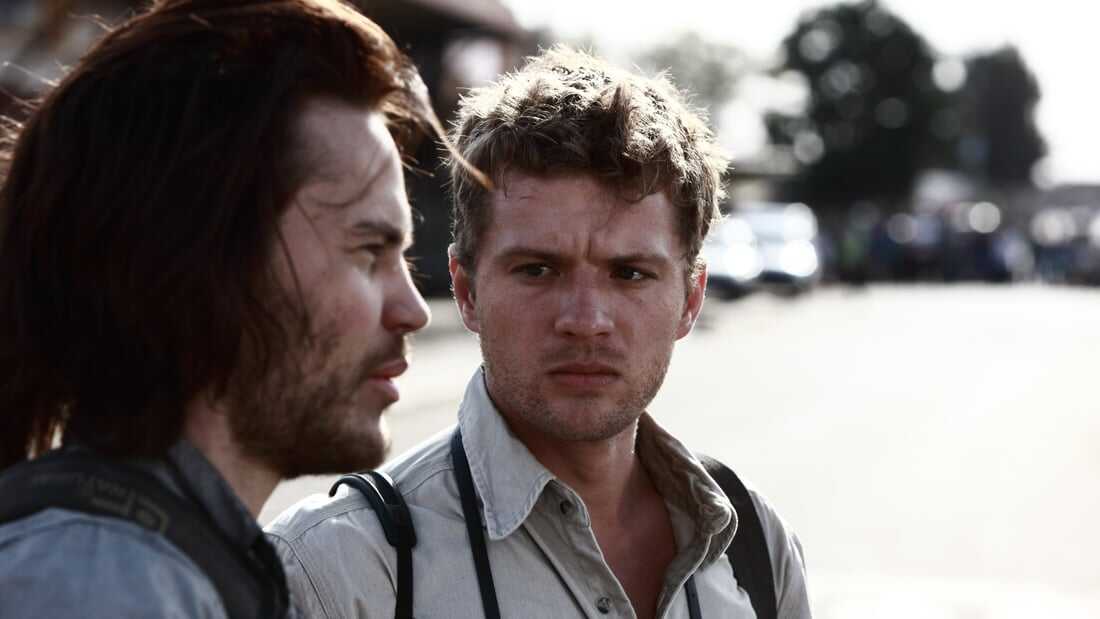
The Bang Bang Club is a Canadian-South African film about the Bang Bang Club from South Africa. The movie is inspired by the autobiographical account of the work done by South African photojournalists during the last days of the Apartheid regime.
The film focuses on the work of Greg Marinovich, Kevin Carter, Ken Oosterbroek, and João Silva, who covered the days after the release of Nelson Mandela till he was elected in 1994.
These four intrepid journalists did whatever was necessary to get the best image to capture the mood and the story of the nation as it transformed. The film earned several Genie Awards nominations and South African Film and Television Awards.
42. Yeelen (1987)
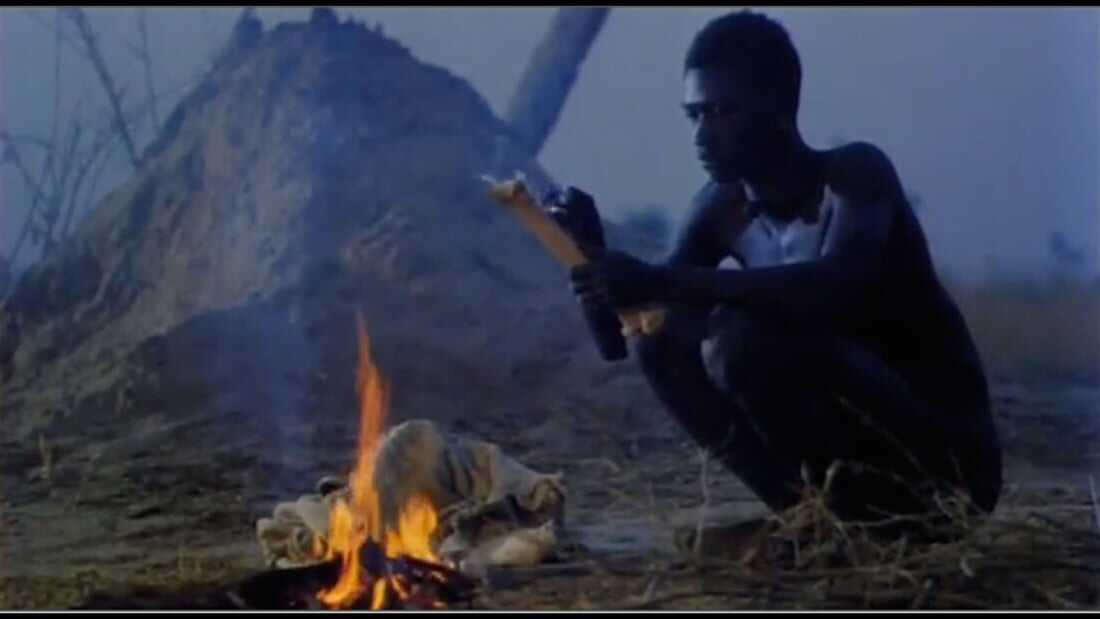
Yeelen is a Malian film about a legendary tale of the struggle and triumph of good over evil. The film was made by Souleymane Cissé in the native Bambara and Fula languages to narrate a powerful tale from the nation’s history.
Nianankoro is a young righteous African man who possesses magical powers given by the blessing of a deity. His father Soma practices magic but the power gets to his head.
The order of Komo prophecies that Soma will die at the hands of Nianankoro. This sends both men on a wild chase across the land to uphold their beliefs of right and wrong.
The director of the film, Souleymane Cissé, wanted to make an epic movie based on African culture that did not depend on Hollywood fanfare and money. The movie was a hit in Africa.
41. Coup de Torchon (1981)
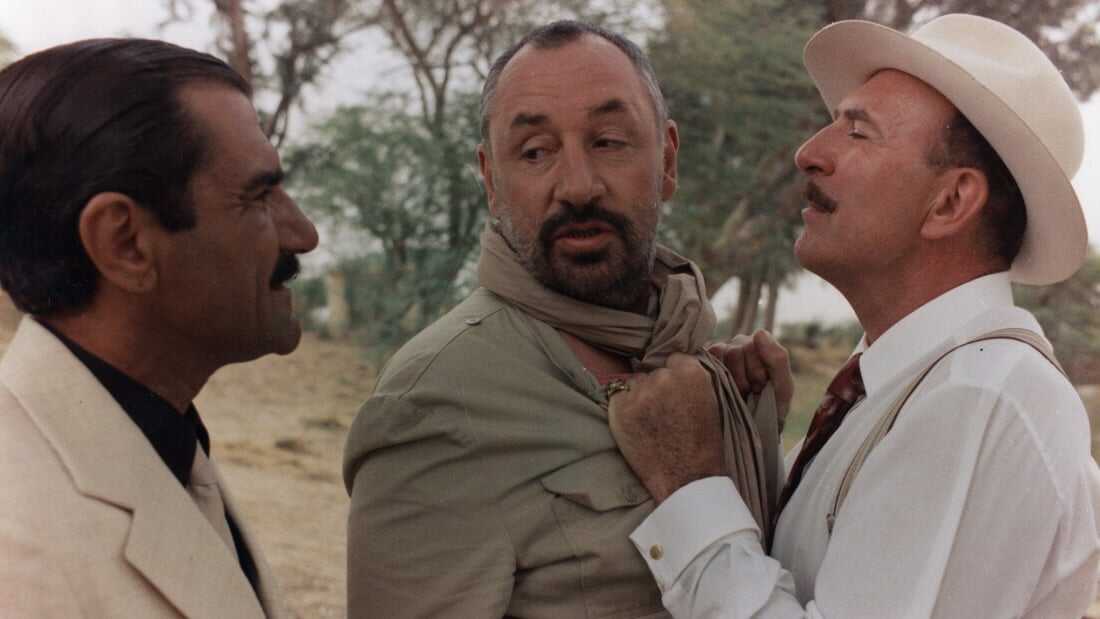
Coup de Torchon is a French crime film based on the novel Pop. 1280 by Jim Thompson written in 1964. The novel is set in an American town. However, the director Bertrand Tavernier moved the location to a West African colony in France.
The film is about a French cop who lives in a predominantly black village where the other white folk is lechers and racists. The cop turns a blind eye to most crimes, and this causes him to be humiliated by everyone.
One day, he has enough of this treatment and decides to turn the tables on everyone. The movie was one of the most-watched films in France. In the US and the UK, it received mixed reviews, with many critics praising the film.
40. Desert Flower (2009)
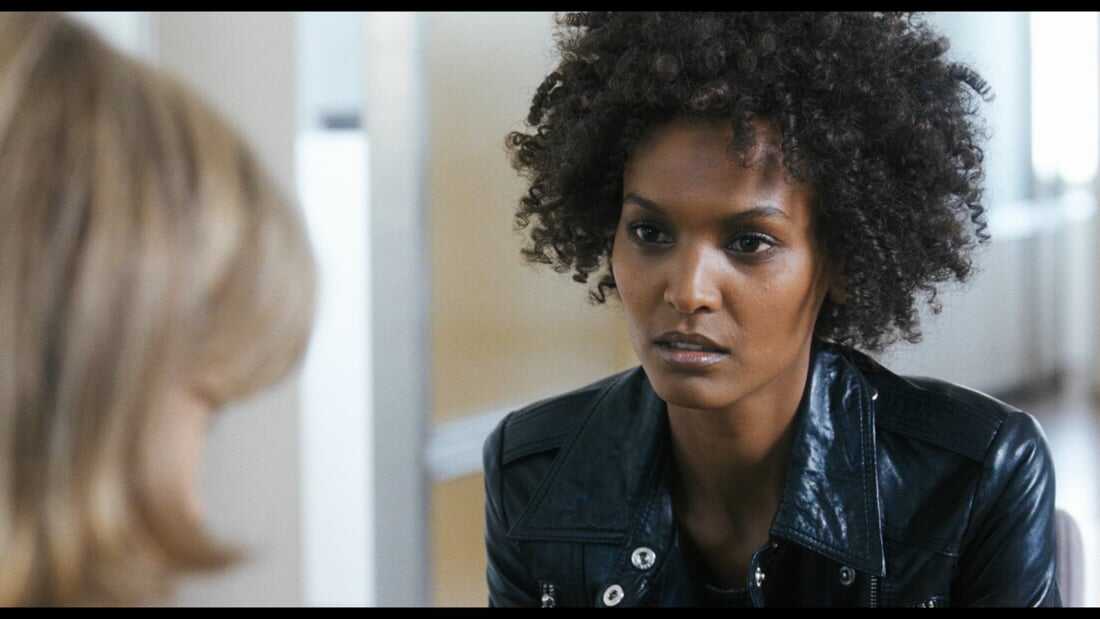
Desert Flower is a biographical drama based on the life of a Somali model, Waris Dirie. This German film was inspired by the autobiography of Waris Dirie, a Somali model who turned into an author and women’s rights activist for the UN against Female Genital Mutilation.
The film follows Dirie’s life story, from her childhood in a Somali desert village to her escape from an arranged marriage and her rise as a successful international model. The movie also highlights the brutal practice of Female Genital Mutilation (FGM), which Waris herself had undergone.
The film’s main message is to raise awareness of FGM and to empower women to stand up against it. The actress, Safa Idriss Nour, who plays young Dirie in the film had to sign a contract that she would never undergo this brutal tribal practice before she got the role.
Later, she reported that her family was being pressured by neighbors and relatives to break the contract.
39. Tabu (2012)
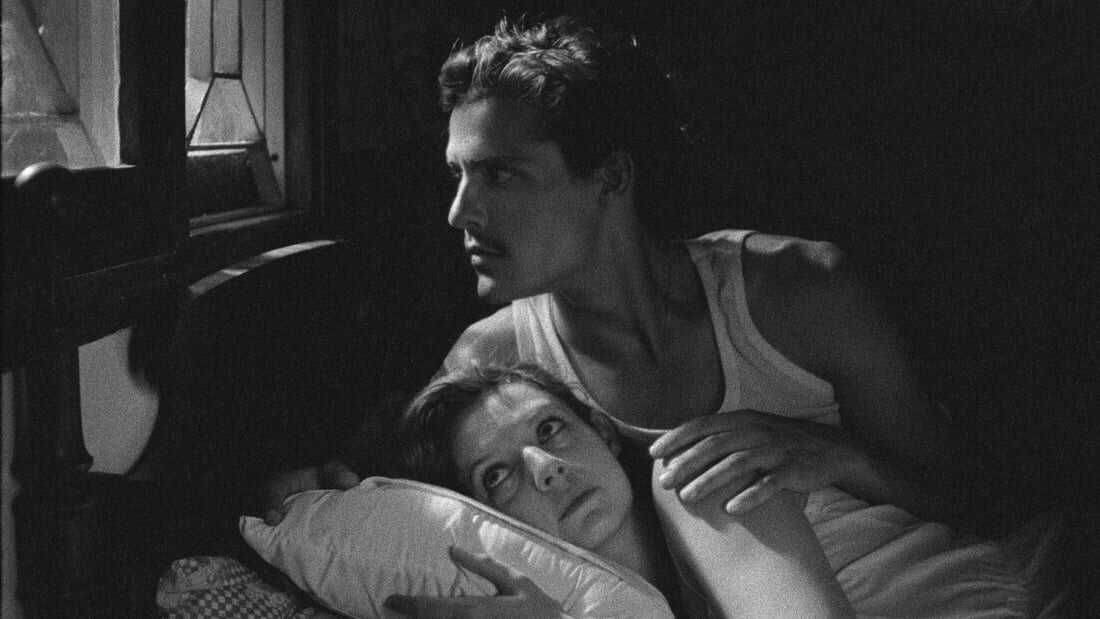
Tabu is a Portuguese-language film directed by Miguel Gomes and set in present-day Lisbon, Portugal. The movie is inspired by an old legend where a young man and woman have a forbidden affair, which ends with the man jumping off the cliff to be eaten by crocodiles.
The film is divided into two parts; the first part is in the present, where an old Aurora is slowly dying but keeps mumbling about a lost friend. Her neighbor and well-wisher try to locate the long-lost friend and realize that they both are lovers in Mozambique.
The film explores themes of nostalgia, memory, and the passage of time. The film was highly acclaimed in international film festivals and won several awards. It was also selected as the Best Film at the 2012 Venice Film Festival and was also nominated for Best Foreign Language Film at the 2013 Academy Awards.
38. Gangster’s Paradise: Jerusalema (2008)

Gangster’s Paradise: Jerusalema is a South African crime film directed by Ralph Ziman. The film was shot on a tight budget, so the director had to use old cameras and used skateboards for dollies.
The movie was a box office bomb as it did not recover the production costs. The film follows the story of Lucky Kunene, a ruthless Johannesburg gang leader who rises to power in the city’s criminal underworld.
Set in the early 2000s, the movie depicts the city’s sprawling slums where Lucky and his gang control are involved in all kinds of carjackings, robberies, etc. The film also deals with themes of poverty, corruption, and the harsh realities of living in the city’s impoverished neighborhoods.
Lucky decides to raise his game by taking over a whole building, and this attracts the attention of the law and fellow criminals. Lucky’s ambition and ruthless nature lead to his downfall as he loses control over his empire and ends up paying the ultimate price.
37. The Good Lie (2014)
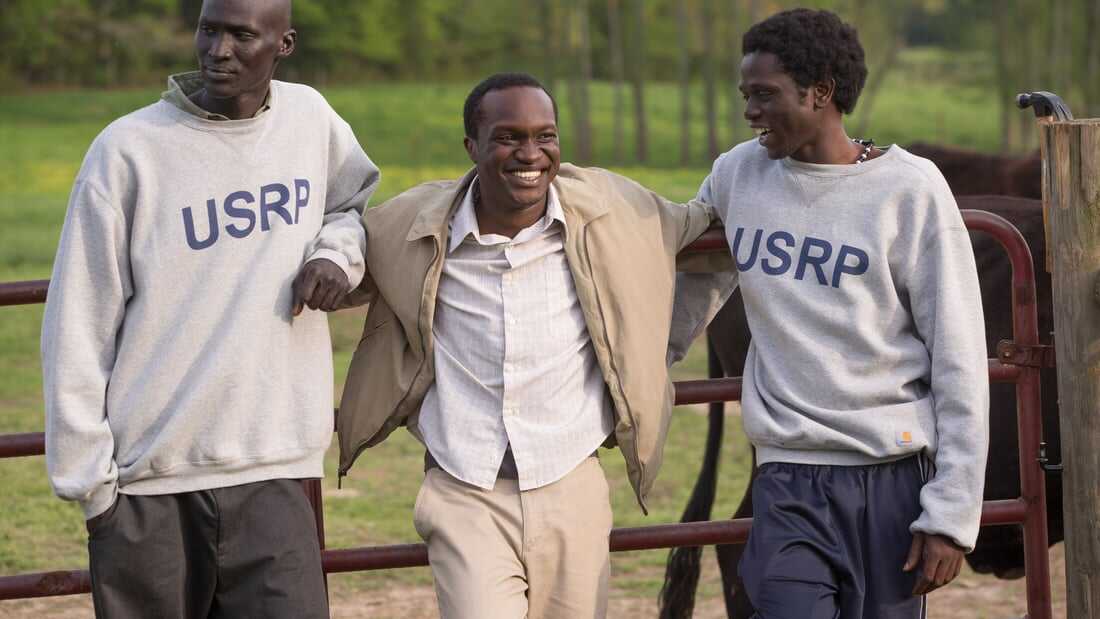
The Good Lie is an American-African drama film directed by Philippe Falardeau. The film is based on the true story of Sudanese refugees known as “The Lost Boys of Sudan” who were forced to flee their homes during the Second Sudanese Civil War.
The film follows the journey of four Sudanese refugees, Mamere, Abital, Jeremiah, and Paul, as they navigate through the refugee camp in Nairobi before they are resettled in the United States.
The film also deals with the themes of loss, trauma, and the struggles of adjusting to a new life in a foreign country. The Good Lie was a true story that brushed aside some nuances of the tale to make a good Hollywood-style thriller.
Yet, it was praised by critics for its performances and its sensitive handling of the subject matter.
36. Pumzi (2009)
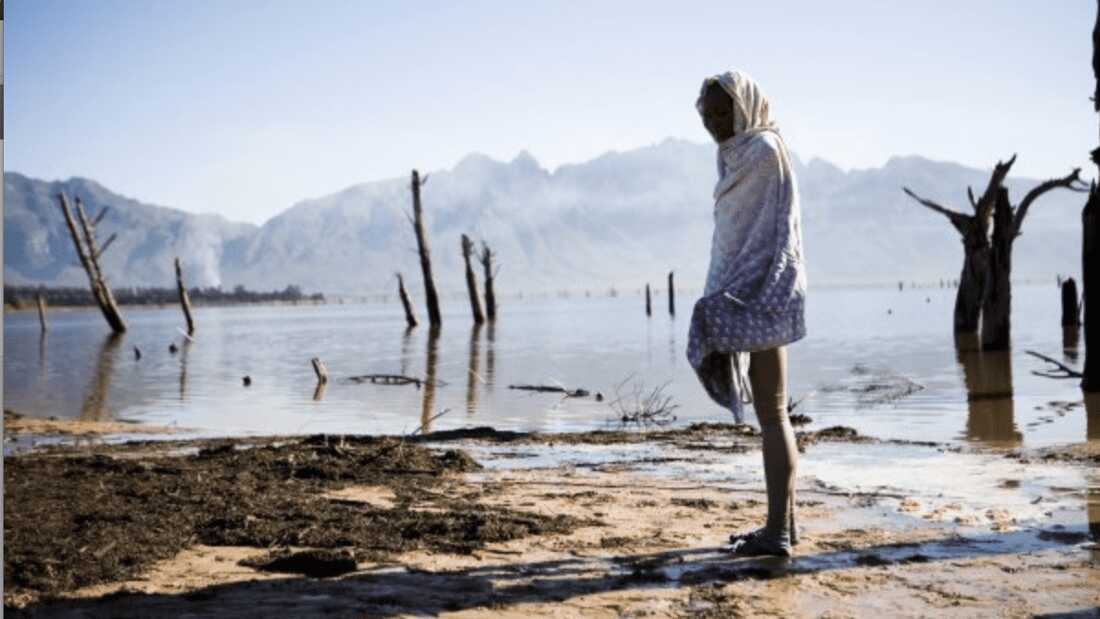
Pumzi is a Kenyan science fiction short film written and directed by Wanuri Kahiu. The title, Pumzi, means Breath in Swahili. The movie was made with a grant from the Changamoto arts fund and Goethe Institut.
The film is set in a post-apocalyptic future where water is scarce and the remaining human population lives in an underground city controlled by a governing body known as The Maitu.
The story follows a young woman named Asha who works as a curator in the city’s Museum of Nature. Asha starts to question the strict rules and regulations of the Maitu when she discovers a hidden seed that could potentially grow into a living organism.
The film explores themes of environmentalism, rebellion, and the power of hope in a bleak future. Pumzi was highly acclaimed for its unique storytelling and creative vision, and it was selected to be screened at several international film festivals.
35. Ali Zaoua: Prince of the Streets (2000)
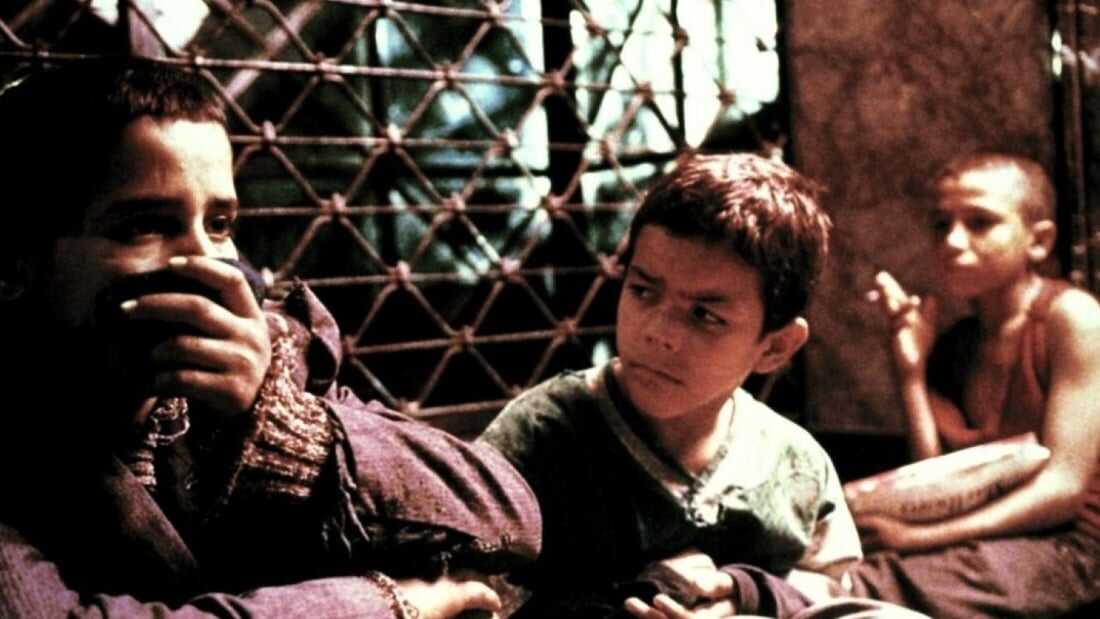
Ali Zaoua: Prince of the Streets is a Moroccan-Belgian drama film written and directed by Nabil Ayouch. The film is set in Casablanca, Morocco, and tells the story of a group of street children who are trying to survive on the streets after being abandoned by their families.
The film follows the character of Ali Zaoua, a street child who dreams of becoming a sailor, as he and his friends try to find a way out of their difficult situation.
They face hopelessness, ostracization, and discrimination to make it through every day. We see poverty, abandonment, and the resilience of the human spirit in the face of adversity. The film was praised by critics for its powerful performances and its sensitive portrayal of the lives of street children.
It was selected for the 2000 Cannes Film Festival and won several awards at international film festivals.
34. The First Grader (2010)
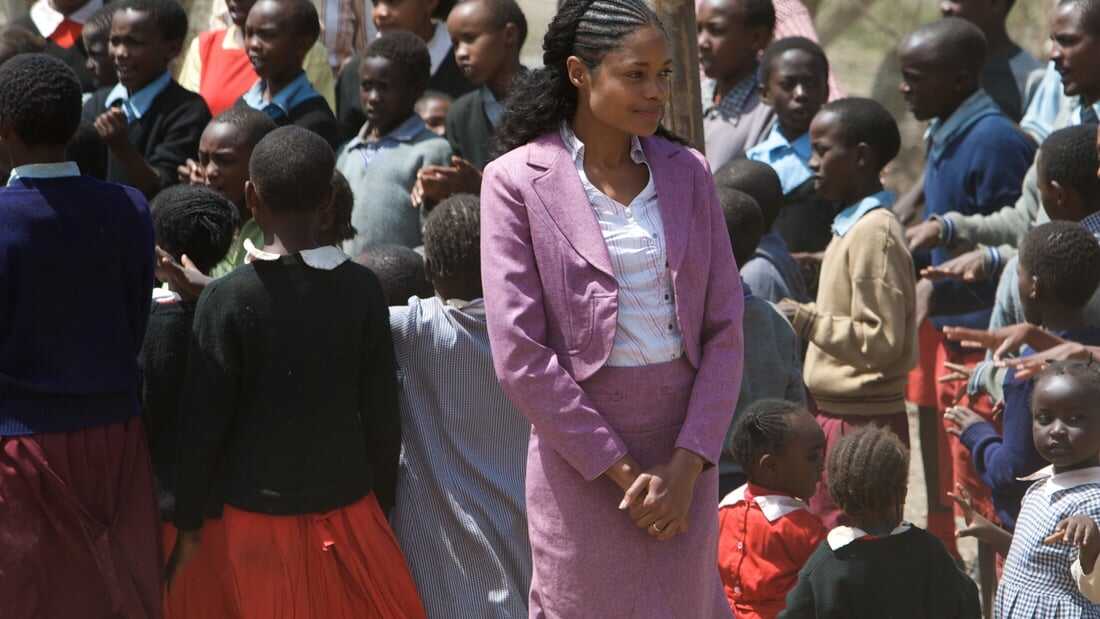
The First Grader is a British-Kenyan drama film directed by Justin Chadwick. The film is based on the true story of an 84-year-old Kenyan veteran named Maruge who, in 2002, decided to go to school for the first time to learn how to read and write.
The film follows Maruge and his journey to attend school despite the challenges and resistance he faces from the school and the government. The film stars Oliver Litondo as Maruge and Naomie Harris as his teacher and was widely praised for its performances and its uplifting message.
The movie also deals with themes of education, ageism, the impact of the colonial past on present-day policies, etc. It was nominated for several awards, including a BAFTA award for Best Makeup and Hair.
33. Atlantics (2019)
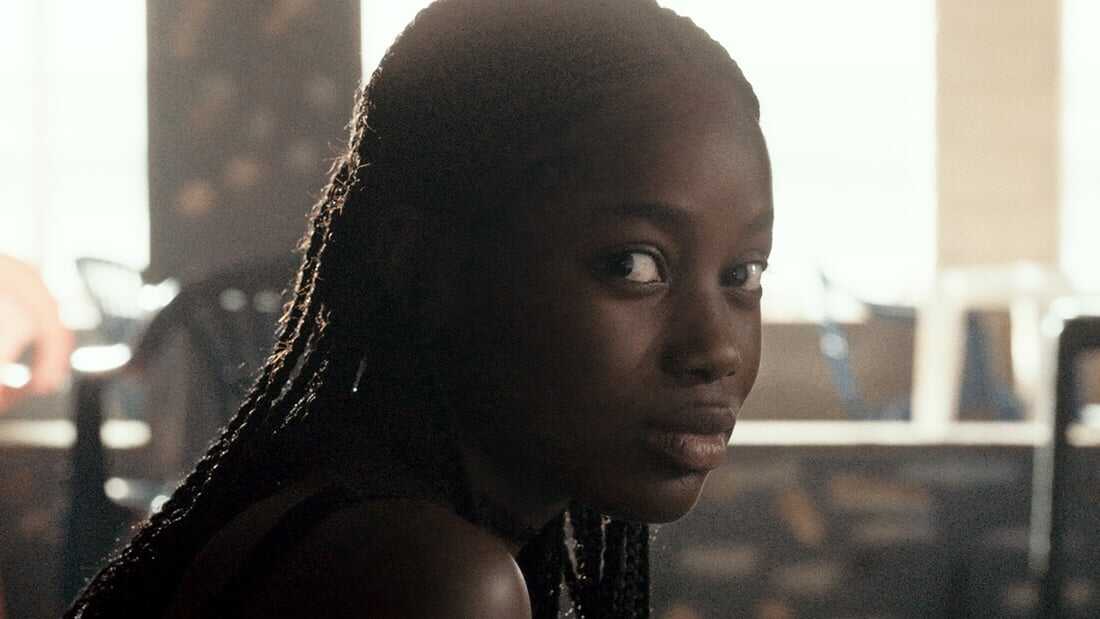
“Atlantics” is a 2019 supernatural romantic drama film directed by Mati Diop in her directorial debut. The film made history at the Cannes Film Festival, as Diop became the first Black woman to direct a film in competition for the prestigious Palme d’Or.
Set in a suburb of Dakar along the Atlantic coast, the story revolves around a futuristic tower and a group of construction workers who decide to leave the country in search of a better future.
The protagonist, Ada, is torn between her lover, Souleiman, and her betrothed, Omar. As the spirits of the lost men return, possessing the bodies of the living,
Ada faces suspicion, interrogations, and a mysterious illness. The spirits demand justice from the tycoon who withheld their pay, and ultimately, the truth about the arson is revealed through footage from the wedding, closing the case.
32. Tsotsi (2005)
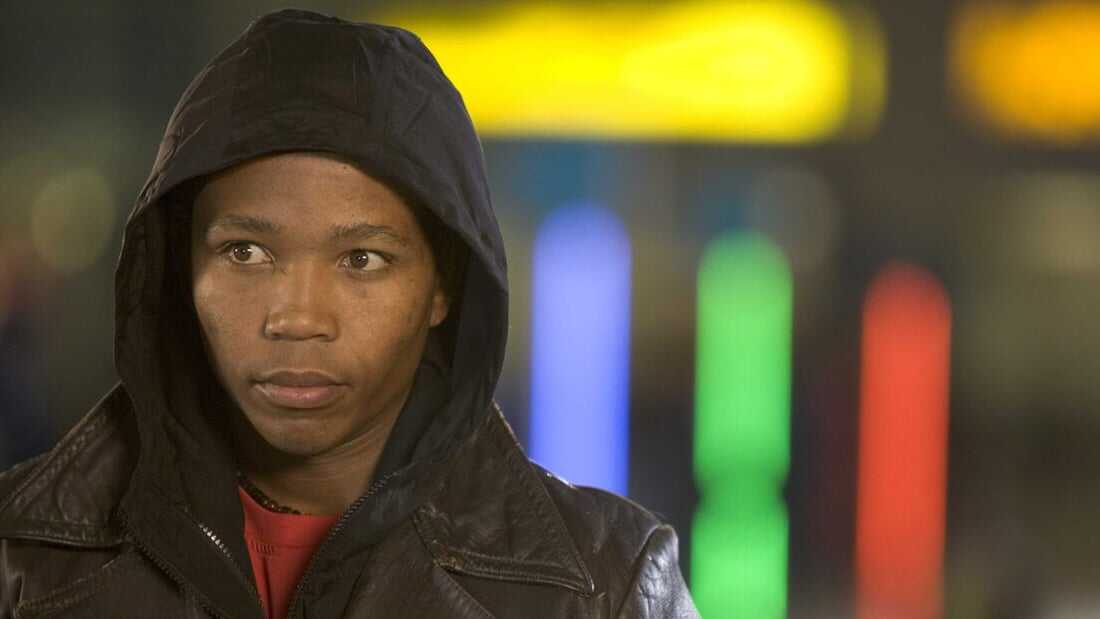
Tsotsi is a critically acclaimed crime drama made under the co-production of the UK and South Africa. The film won the Academy Award for best foreign language film. It was also the first African, non-French film to be nominated.
The movie is the adaptation of the novel of the same name by Athol Fugard. The film starts with David, a young boy who runs away from his abusive home to live in the slums of Alexandra in Johannesburg.
He grows up into a small-time thug, Tsotsi, with his own gang of criminals. One day, he steals a car with a baby in the back seat, and this incident brings a world of troubles and changes into Tsotsi’s life.
The direction, story, acting performances, and cinematography of the film were highly acclaimed. It won 23 more awards, apart from the Oscar.
31. Shooting Dogs (2005)
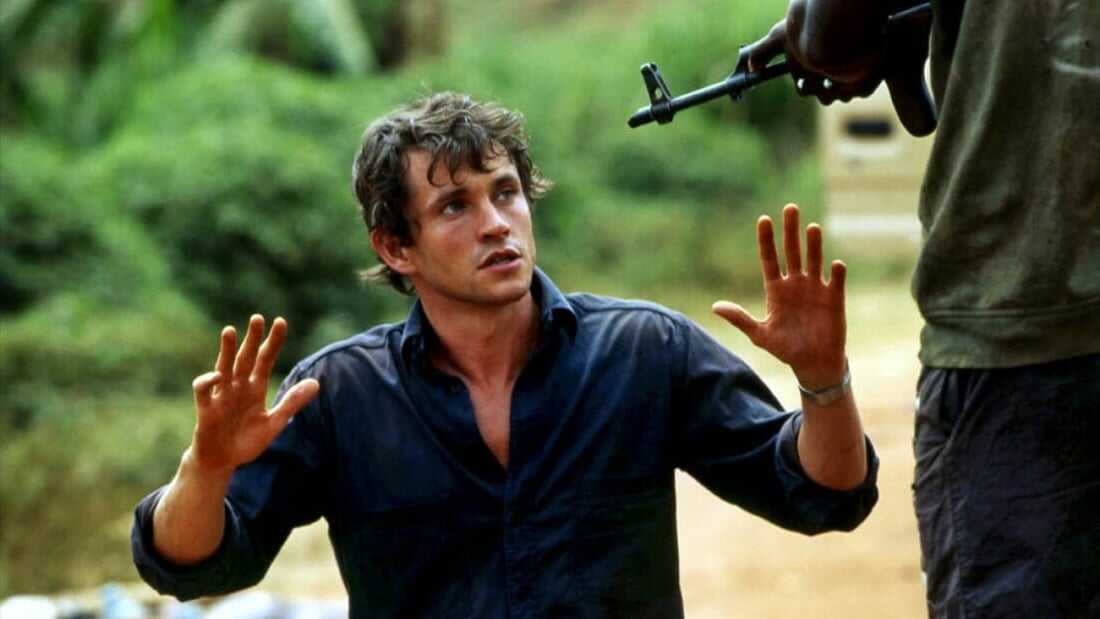
Shooting Dogs is a British-German drama film directed by Michael Caton-Jones. The film is based on the true story of the Rwandan genocide in 1994. The film is based on the experiences of BBC news producer David Belton who was working in Rwanda during the genocide.
The story is of a Catholic priest and a young teacher, who are working at a school in Kigali, Rwanda when the genocide begins. We see their struggles to protect and save the lives of the students, their staff, and the Tutsi refugees who seek refuge in the school, as well as the moral dilemmas they face in the face of the atrocities taking place around them.
The film was widely praised for its performances, particularly John Hurt’s portrayal of the priest, and its powerful and emotional depiction of the events of the genocide. It was nominated for several awards, including the BAFTA for Best Supporting Actor.
30. Tears of the Sun (2003)
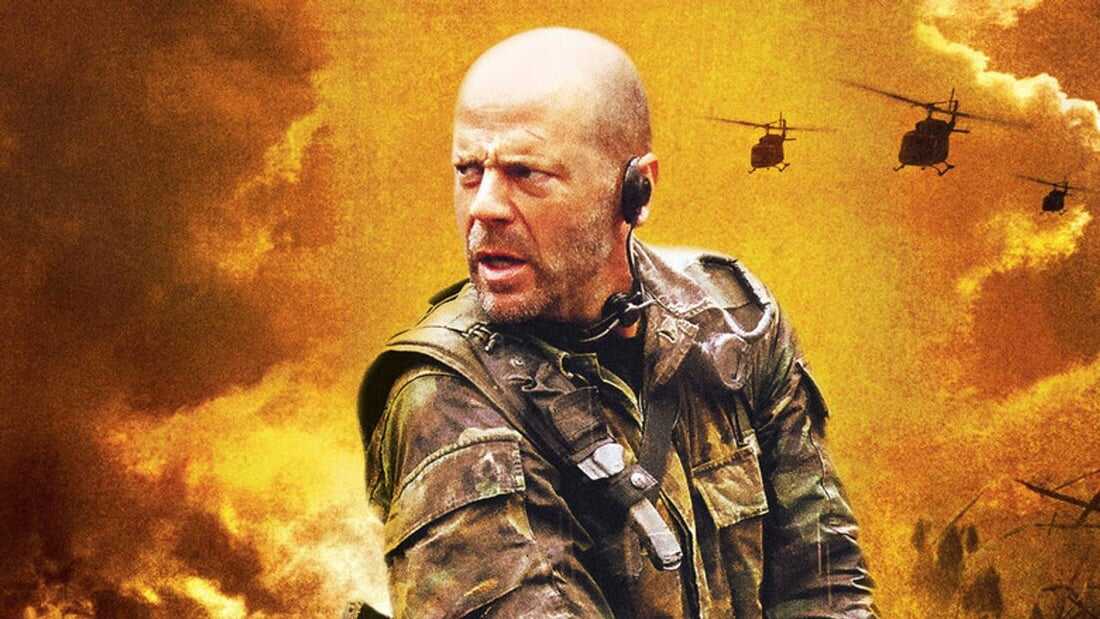
Tears of the Sun is an American action-war film directed by Antoine Fuqua. The film is set in Nigeria during a civil war and follows a team of Navy SEALs who are sent on a mission to the Niger Delta.
They have to rescue American citizens and foreign nationals from a remote oil platform, who are in danger of being killed by rebel forces. The team is led by Lieutenant A. K. Waters, and the mission becomes complicated when he and his team find themselves facing moral dilemmas and having to choose between completing their mission and saving lives.
The film deals with themes of loyalty, sacrifice, and the moral complexities of war. The film was praised for its performances and its intense action sequences but criticized for its portrayal of African characters.
29. Yesterday (2004)
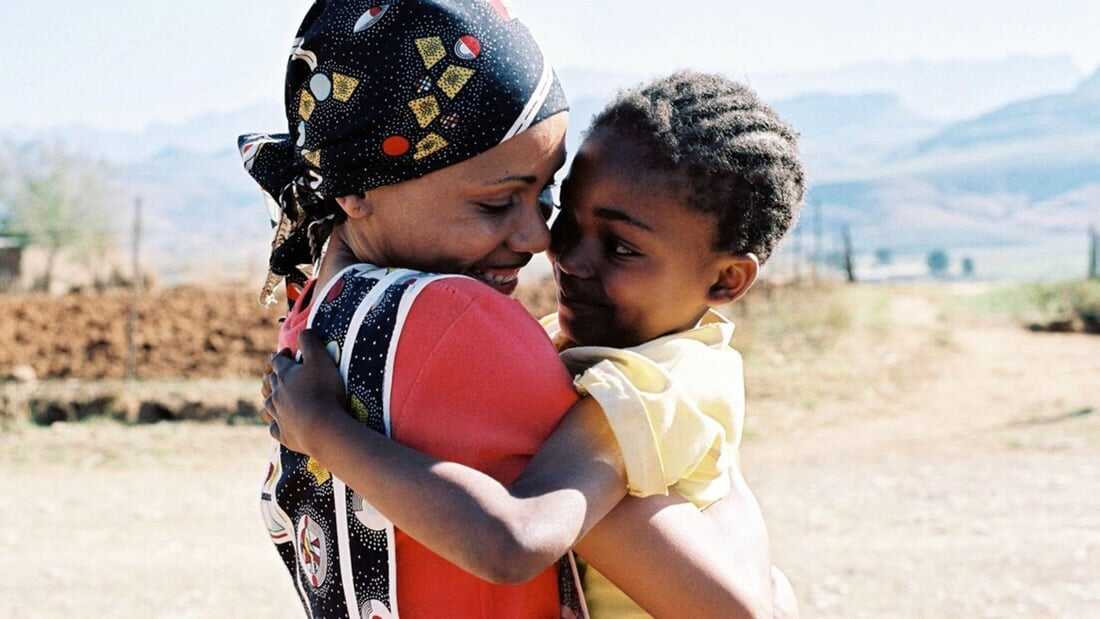
Yesterday is a 2004 South African film directed by Darrell Roodt. The movie was nominated for Best Foreign Language film at the Academy Awards. The movie tells the story of a young HIV-positive mother named Yesterday.
She lives in a rural village in South Africa and must confront the challenges of living with HIV in a community that is largely uneducated about the disease. Her husband is a migrant mine worker, and he lives in denial of the fact that he gave her the disease so he is also infected.
The film explores themes of love, acceptance, and the impact of HIV/AIDS on individuals and families in South Africa. The movie was critically acclaimed and won several awards, including the Audience Award for World Cinema at the Sundance Film Festival.
28. Queen of Katwe (2016)
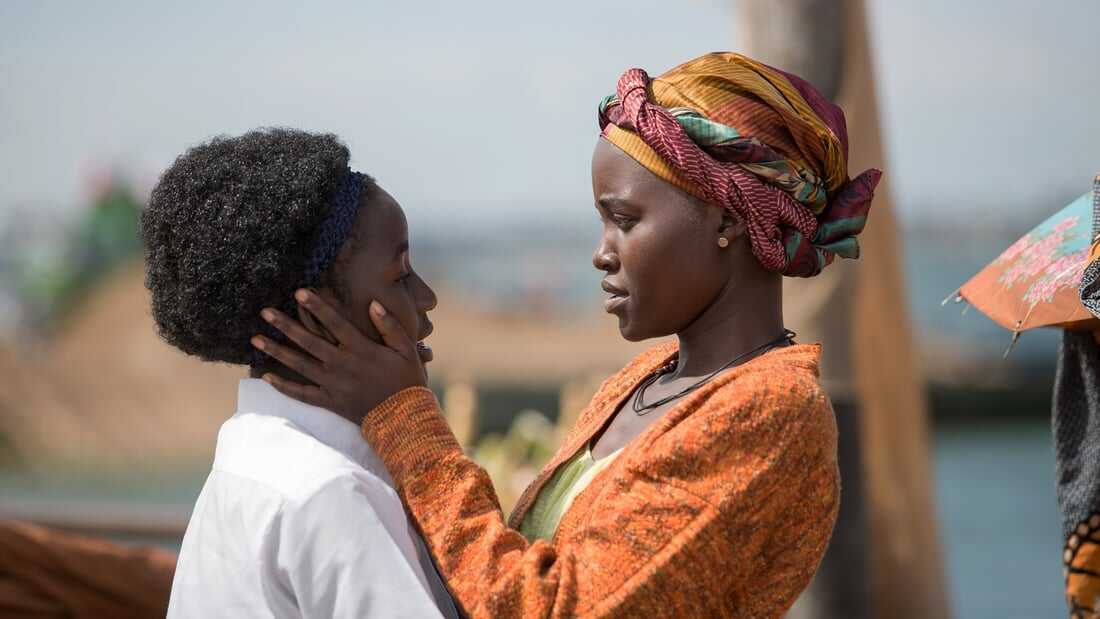
Queen of Katwe is a 2016 American-Ugandan biographical drama film directed by Mira Nair. The film was a joint production by Walt Disney Pictures and ESPN Films. It was inspired by the article on Phiona Mutesi printed in ESPN magazine by Tim Crothers.
The movie is based on the true story of Phiona Mutesi, a young girl living in the slum of Katwe in Kampala, Uganda. She discovers her aptitude for chess and rises through the ranks to become a national champion.
The film follows Phiona’s journey as she learns to play chess and overcomes the poverty and personal struggles she faces. The film received critical praise for the performance of Lupita Nyong’o and David Oyelowo upon release.
Alongside Lupita Nyong’o and David Oyelowo, the film also stars Madina Nalwanga as Phiona, who received critical acclaim for her portrayal of the chess prodigy.
27. Borders (2017)
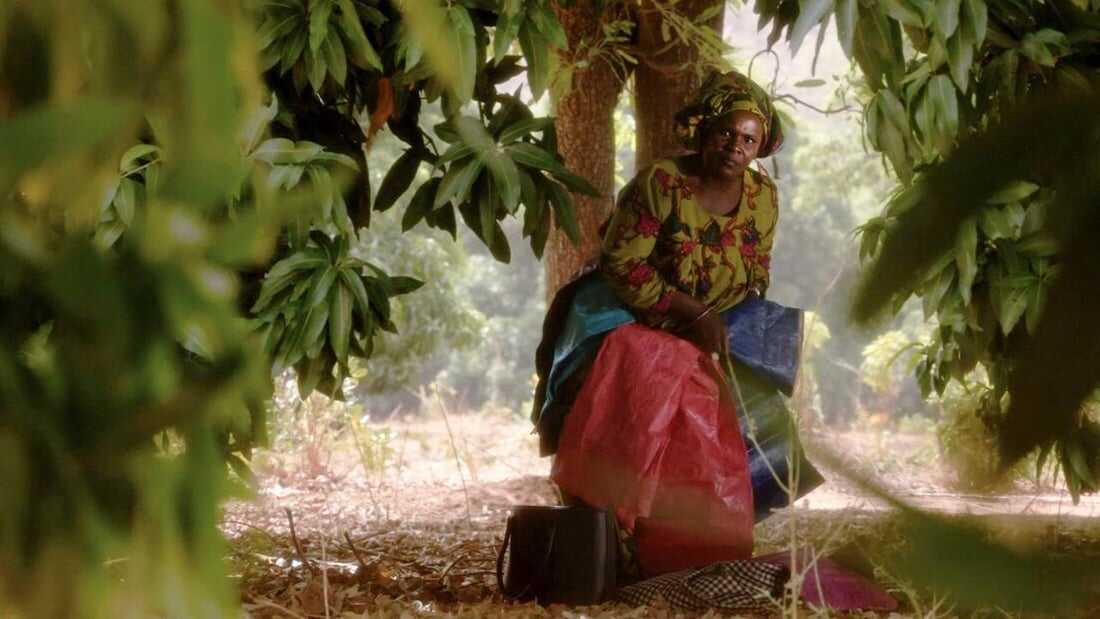
“Borders” is a 2017 drama film co-produced by Burkina Faso and France, directed and written by Apolline Traoré.
The movie follows four women who meet on a bus journey across West Africa and form unexpected friendships.
Despite coming from different regions, they realize their lives are remarkably similar, as they have all faced the challenges of being an independent woman.
Director Apolline Traoré emphasized the authenticity of the film by having the production team travel the same route as depicted in the story. “Borders” has gained recognition and was included in The Guardian’s list of the top twenty African films of all time.
26. The Gods Must Be Crazy (1980)
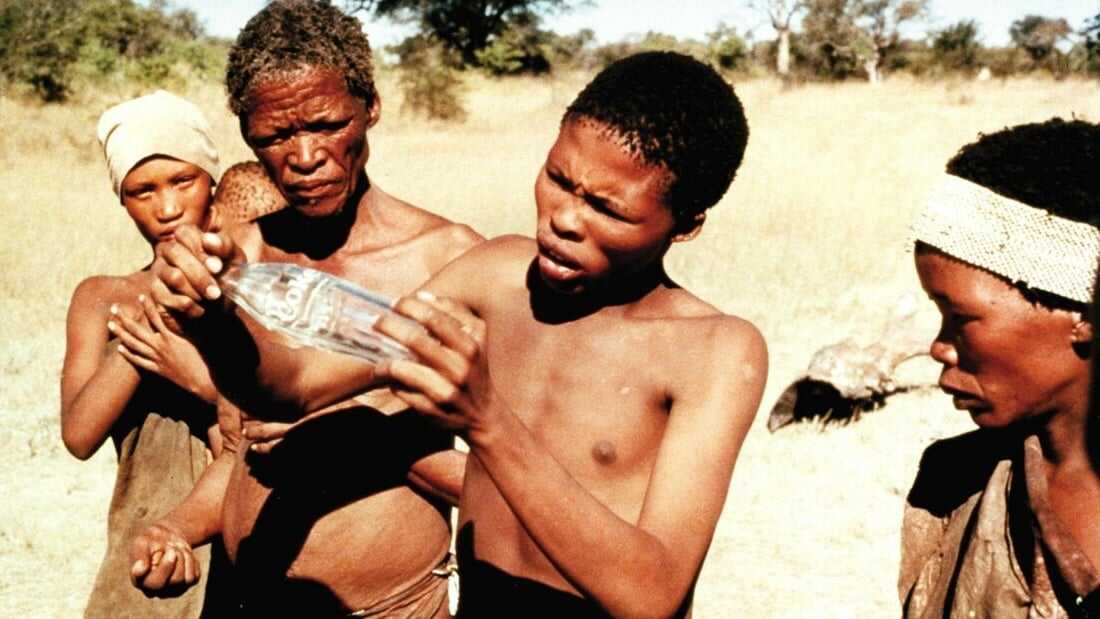
The Gods Must Be Crazy is a 1980 South African comedy film written and directed by Jamie Uys. It is the first film in the film series and was a major critical and commercial success.
The movie tells the story of a Kalahari Desert tribe who come into contact with the outside world when a Coca-Cola bottle is thrown out of an airplane and lands in their territory.
The movie is considered a classic and is credited with introducing many people to the culture and way of life of the San people of southern Africa. The film was also significant for its depiction of the negative impacts of modern civilization on traditional cultures.
However, the film was criticized for its stereotypical portrayal of the indigenous people and its portrayal of Western civilization as superior. Despite its shortcomings, the movie is considered to have had a significant impact on the perception of Africa and its people.
25. Nowhere in Africa (2001)
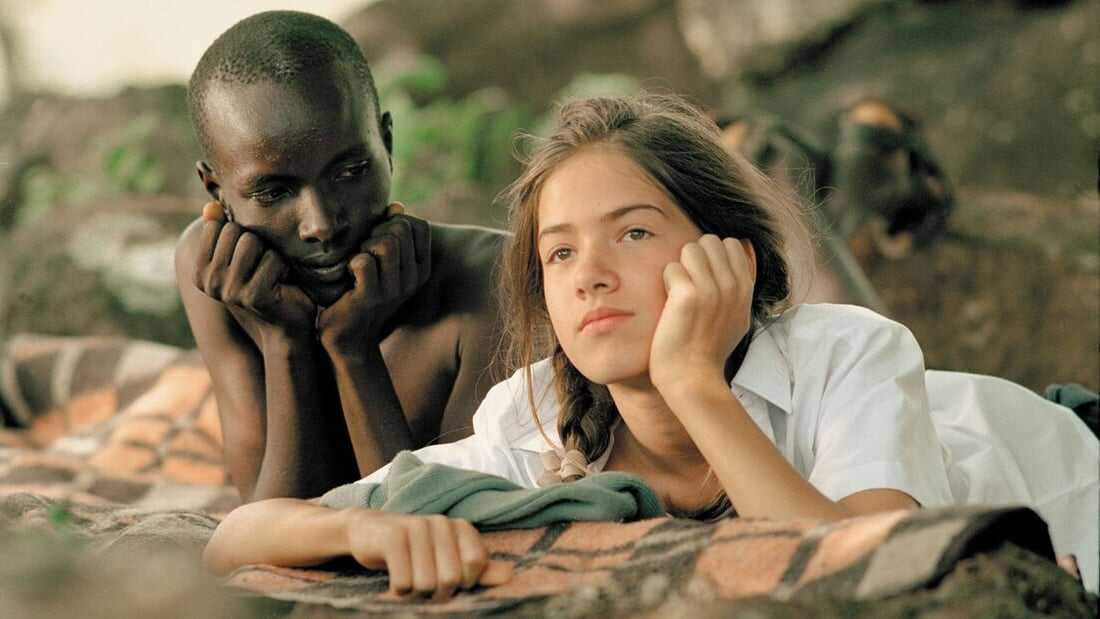
Nowhere in Africa is a 2001 German-Austrian-Polish film directed by Caroline Link. The movie is based on the autobiographical novel of the same name by Stefanie Zweig. It tells the story of a German-Jewish family who fled Nazi Germany and moved to Kenya in the 1930s.
Initially, the wife is reluctant to settle in Africa and hates life there. Thinking that his wife hates the farm life, her husband joins the British army and arranges for the family to return to Germany after the war.
The film follows the family’s struggles to adapt to their new surroundings and the changes in their relationships with each other and the local community. The film also explores the theme of identity and the question of where one truly belongs.
The movie received critical acclaim and won the Academy Award for Best Foreign Language Film in 2003.
24. Sometimes in April (2005)
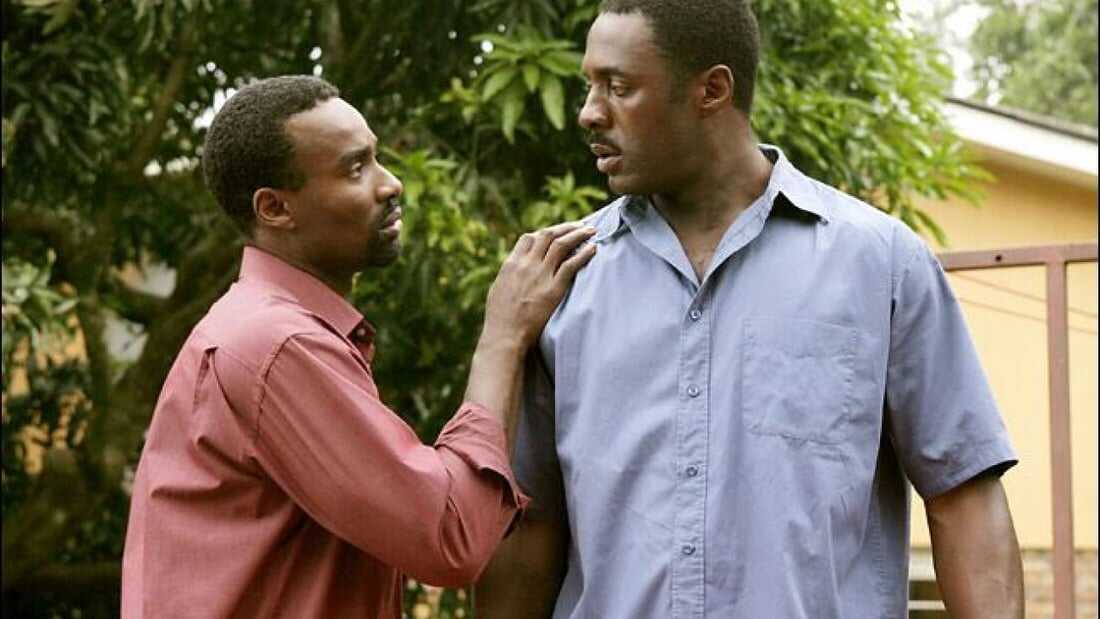
Sometimes in April is a 2005 American historical drama film directed by Raoul Peck. The movie is set in Rwanda in the 1990s and tells the story of the Rwandan genocide, in which an estimated 800,000 Tutsi and moderate Hutu people were killed in just 100 days.
The film explores the themes of love, loyalty, and betrayal through the eyes of a Hutu family and a Tutsi family. The movie is considered a powerful and moving depiction of the atrocities of the Rwandan genocide and its impact on the individual lives of Rwandans.
The film has been praised for its performances and its ability to convey the complexity of the historical events that took place in Rwanda. The movie has been praised for its ability to bring attention to the Rwandan genocide, which was underreported in Western media at the time, and for its ability to educate and raise awareness about the genocide among the audience.
23. Shake Hands with the Devil (2007)
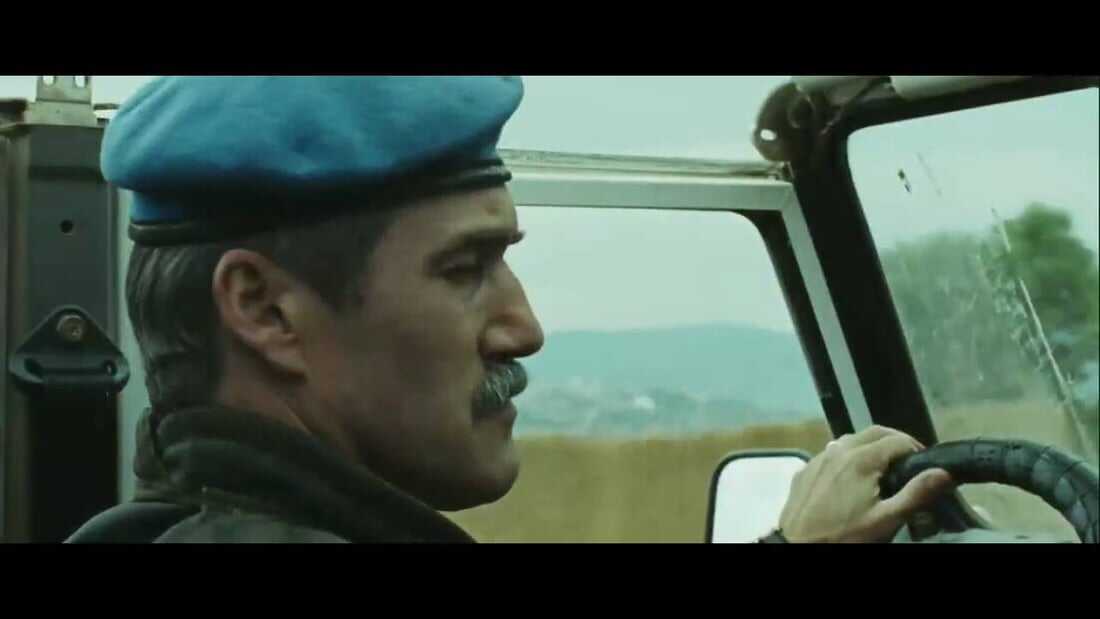
Shake Hands with the Devil is a 2007 Canadian war drama based on the events of the Rwandan genocide. The movie is based on the autobiographical book Shake Hands with the Devil: The Failure of Humanity in Rwanda written by Roméo Dallaire.
The movie is based on the memoir of Romeo Dallaire, the Canadian general, who was in charge of the UN peacekeeping mission in Rwanda during the genocide of 1994. The film is a personal account of Dallaire’s experiences during the genocide and the failure of the international community to intervene to stop the atrocities.
The movie has been praised for its powerful and emotional portrayal of the events in Rwanda and Dallaire’s courageous efforts to try to stop the violence. The film is considered an important contribution to the understanding of the Rwandan genocide and the role of the UN peacekeeping forces in the country.
The movie was nominated for 12 Genie Awards in 2008.
22. Lord of War (2005)
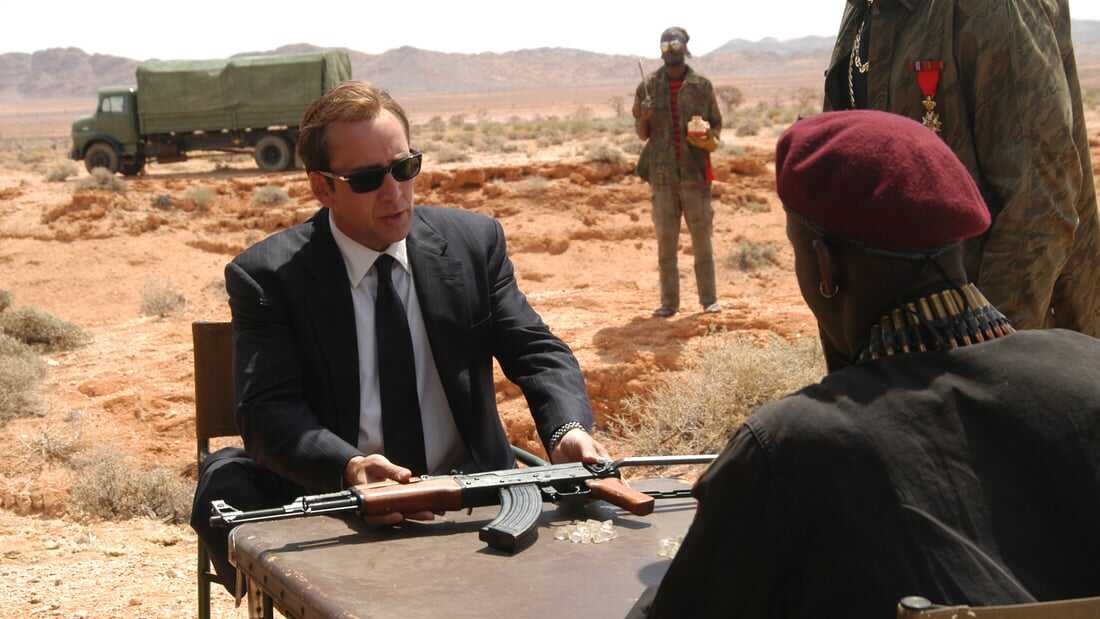
Lord of War is a 2005 American crime drama film directed by Andrew Niccol. He contacted many real-life arms dealers and used actual tanks and AK-47s for shooting instead of prop guns.
The movie stars Nicolas Cage as Yuri Orlov, an arms dealer who becomes a leading player in the global arms trade. The film explores themes of morality, the illegal arms trade, and its impact on the world.
The movie has a non-linear narrative that follows Orlov’s life and his rise to the top of the arms industry. The film also features several real-life footages of conflicts around the world and it highlights the impact of the illegal arms trade on the countries and individuals involved.
The film received mixed reviews upon release, with some praising the performances and the story while others criticized the film for its lack of depth and its lack of a clear political stance.
21. The Siege of Jadotville (2016)
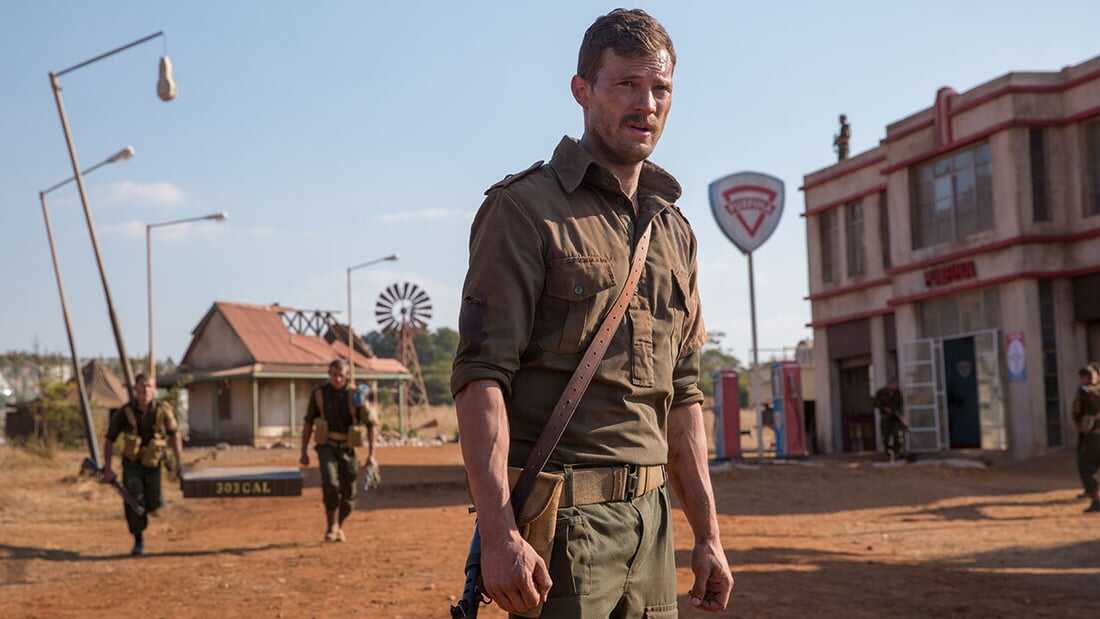
The Siege of Jadotville is a 2016 Irish-American war film directed by Richie Smyth. The movie is based on the true story of the Siege of Jadotville, which took place during the Congo Crisis in 1961.
The film follows the story of a company of Irish UN peacekeepers led by Commandant Pat Quinlan, who is sent to the mining town of Jadotville to protect the local population.
They are quickly surrounded by a much larger force of Congolese troops loyal to the breakaway province of Katanga. The film tells the story of the Irish soldiers’ heroic defense of Jadotville against overwhelming odds and the subsequent cover-up of their actions.
The movie was praised for its performances, direction, and attention to detail in recreating historical events. It received positive reviews from critics and was considered a strong and engaging portrayal of the siege.
20. Amistad (1997)
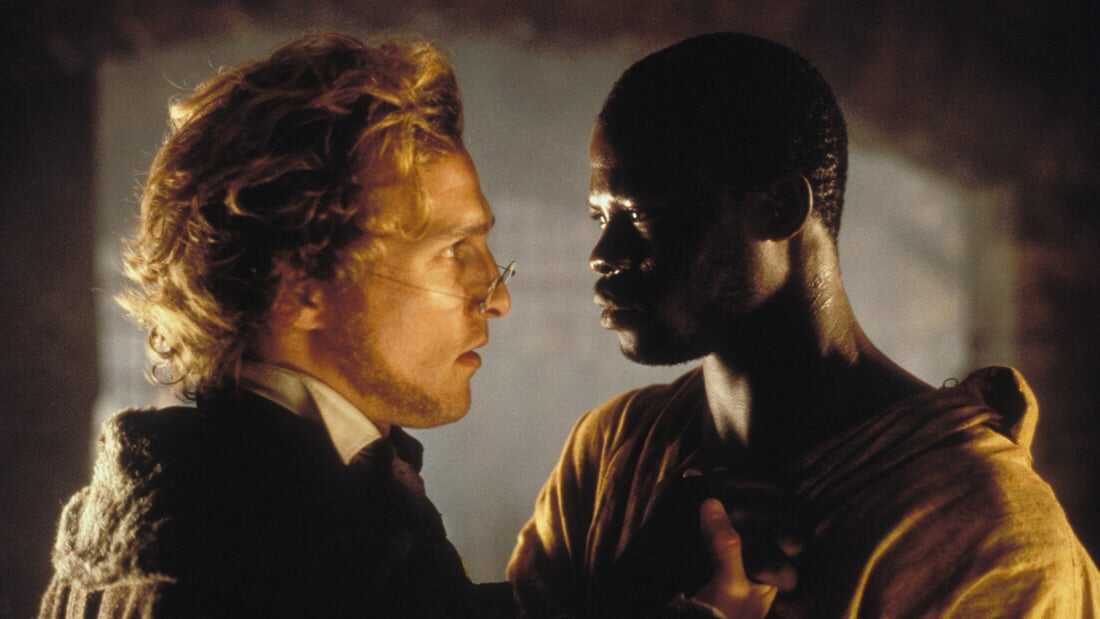
Amistad is a 1997 American historical drama film directed by Steven Spielberg. The movie is based on the true story of the 1839 rebellion of enslaved Africans on board the Spanish slave ship La Amistad.
The film follows the legal battle that ensues after the survivors are captured and put on trial in the United States for murder. The movie explores themes of slavery, freedom, and the fight for justice.
The film features an all-star cast including Morgan Freeman, Anthony Hopkins, and Matthew McConaughey, and was praised for its performances and its powerful depiction of historical events. The movie received positive reviews from critics, and it was considered a powerful and thought-provoking film that brought attention to the injustices of the transatlantic slave trade.
19. The Mummy (1969)
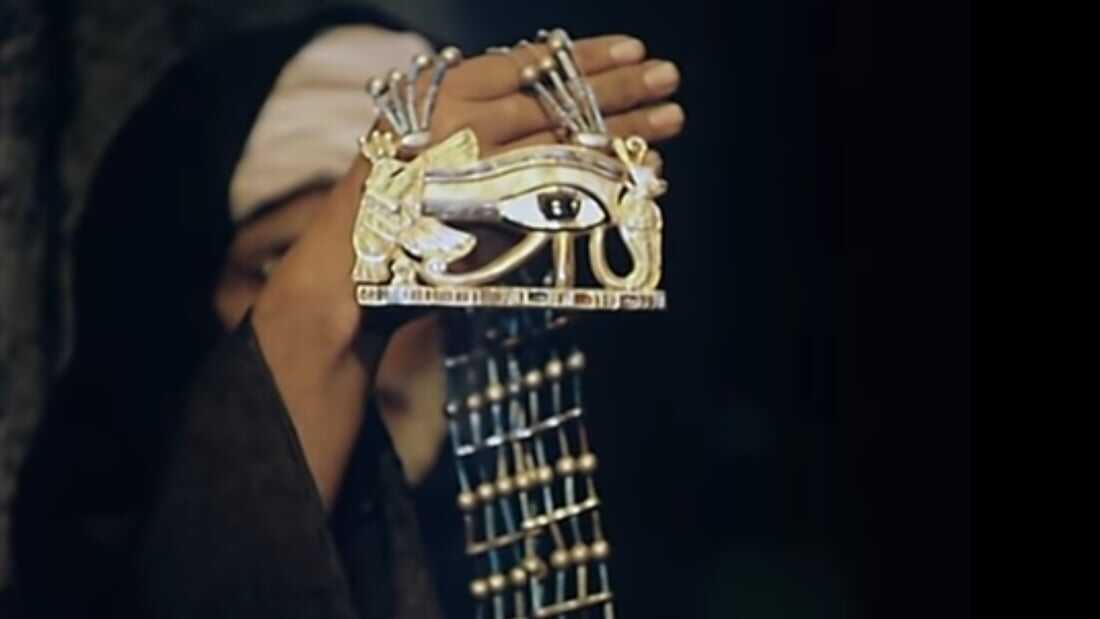
The Mummy is a 1969 Egyptian film by director Shadi Abdel Salam. It is the finest example of Egypt’s cinema revolution of neo-realist films, and this film continues to be listed as one of the greatest Egyptian films ever made.
The film was originally named The Night of Counting the Years, and produced by Roberto Rossellini, who was very impressed by the script. The film story revolves around an impoverished clan in Northern Egypt that robbed antiquities from the royal tombs of the pharaohs.
They make a business of robbing tombs and selling precious antiques on the black market but internal strife leads to a dissident member ratting out the entire operation to the government.
The film was almost lost to the public but Martin Scorsese’s World Cinema Foundation restored the movie using the original 35mm camera and sound negatives from the Egyptian archives.
18. The English Patient (1996)
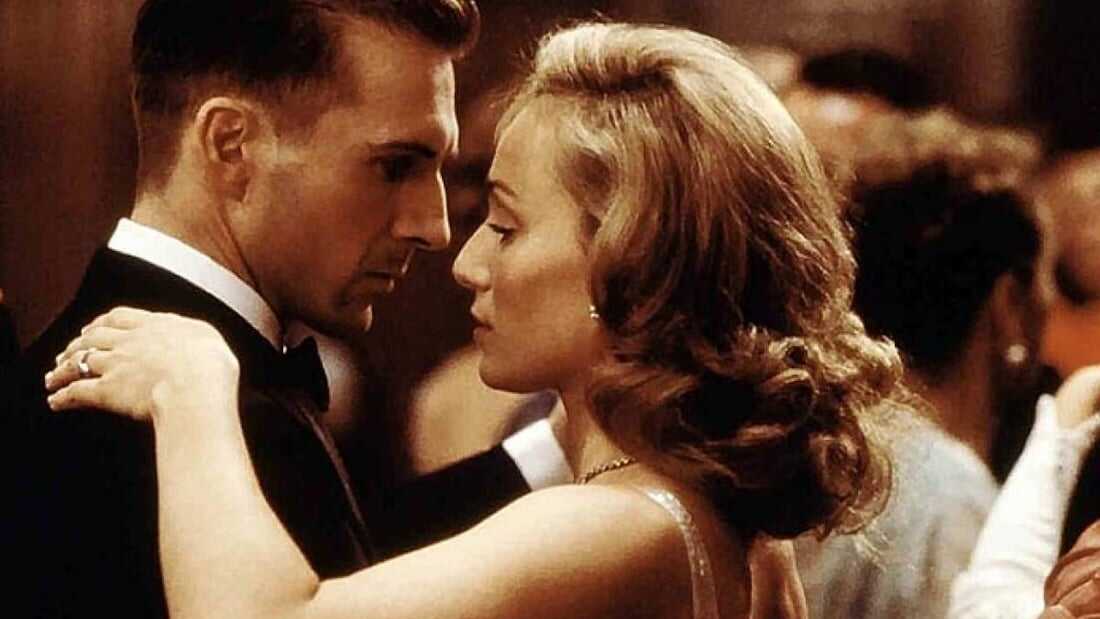
The English Patient is a 1996 romantic war drama film directed by Anthony Minghella. The movie is based on the novel of the same name by Michael Ondaatje. The film is allegedly based on the life of László Almásy, although it is a fictional account of it.
The film tells the story of a wounded, unnamed English patient and the nurse who tends to him in a Tuscan villa at the end of World War II. As the nurse reads to him from a book, the patient recounts his past experiences in the desert, including his love affair with a married woman.
The movie explores themes of love, loss, and identity, and it’s considered a powerful and moving depiction of the human condition during the war. The film won nine Academy Awards, including Best Picture and Best Director, and received widespread critical acclaim.
17. Invictus (2009)
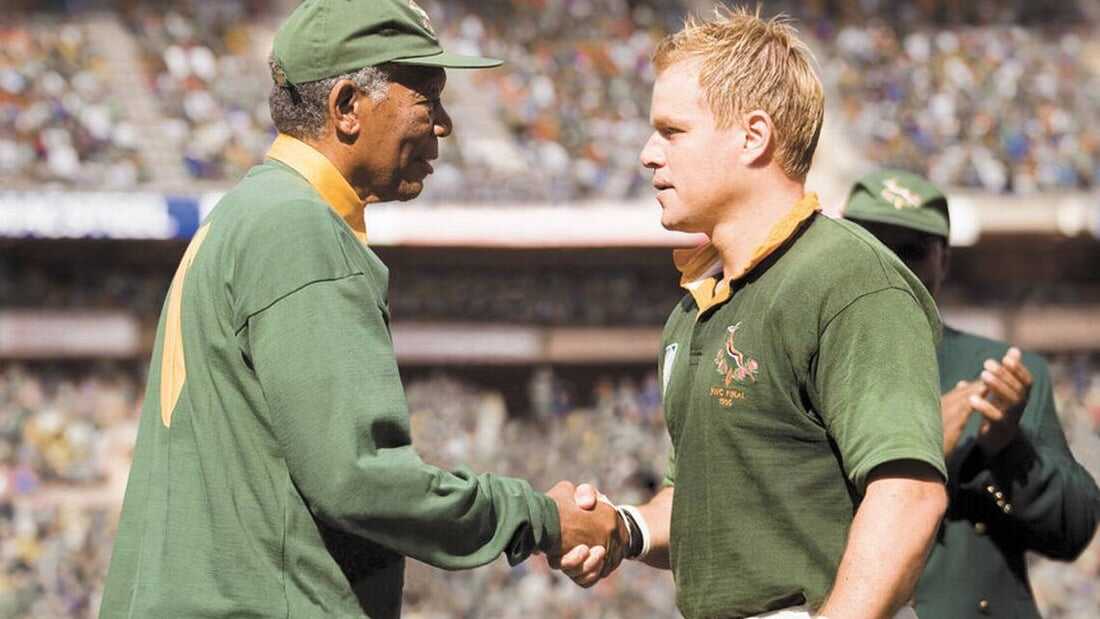
Invictus is a 2009 American-South African sports drama film directed by Clint Eastwood. The movie is based on the true story of the South African rugby team’s victory in the 1995 Rugby World Cup.
The film stars Morgan Freeman as Nelson Mandela and Matt Damon as François Pienaar, the captain of the South African rugby team. In his first term as president, Nelson Mandela tries to unite Apartheid-scarred citizens using the Rugby world cup as a means to bring two races together.
The movie explores themes of unity, forgiveness, and leadership. The film received mixed reviews from critics; some praised its performances and the directing, while others criticized it for oversimplifying the historical events.
Despite mixed reviews, it was a box office success and was considered an inspiring and uplifting film that brought attention to the events and the impact of the Rugby World Cup on South Africa’s post-apartheid society.
16. Out of Africa (1985)
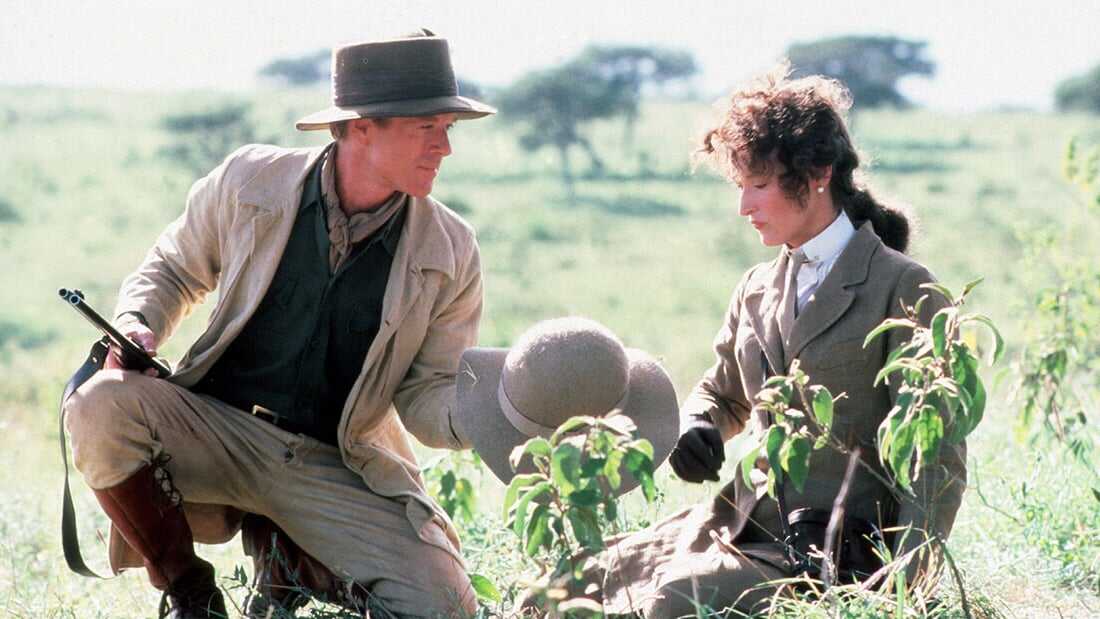
Out of Africa is a 1985 American epic romantic drama film directed by Sydney Pollack. The movie is based on the memoir of the same name by Karen Blixen. Outside of Nairobi, there is a town called Karen, named after Karen Blixen.
It tells the story of a Danish woman, Karen, who moves to Kenya in 1914 to run a coffee plantation. The film explores her relationships with her husband, her lover, and the local people as well as her experiences living in Africa.
The movie is known for its stunning cinematography and its evocative depiction of Africa. The film stars Meryl Streep as Karen Blixen and Robert Redford as her lover, Denys Finch Hatton.
The movie was critically acclaimed; it won seven Academy Awards, including Best Picture, Best Director, and Best Adapted Screenplay.
15. Beasts of No Nation (2015)
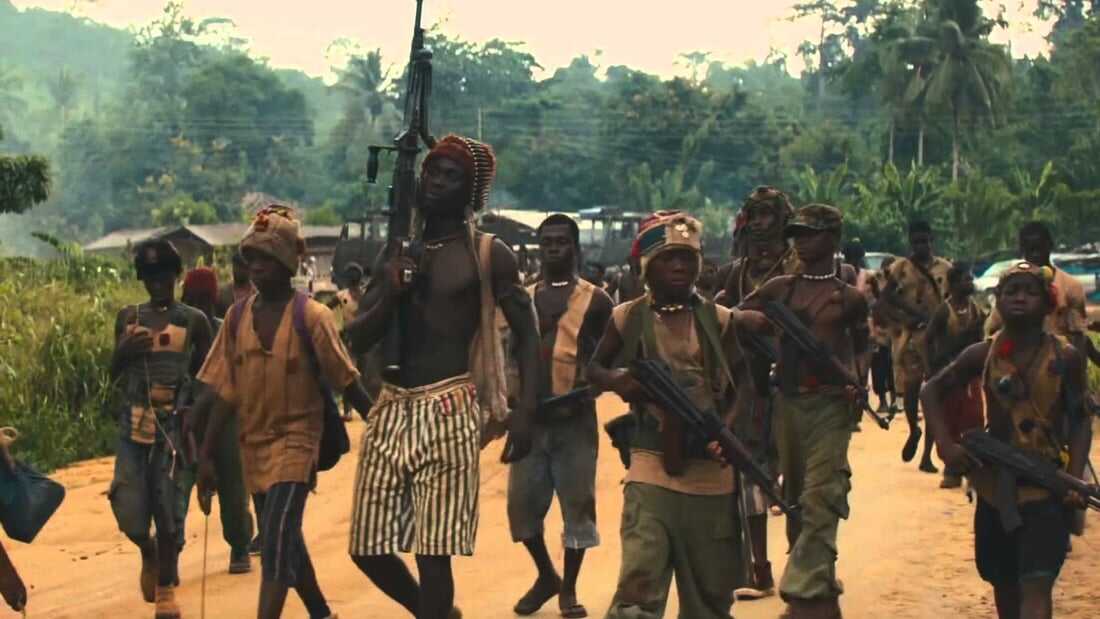
Beasts of No Nation is a 2015 American-Ghanaian war drama film directed by Cary Fukunaga. The movie is based on the novel of the same name by Uzodinma Iweala and tells the story of a young boy, Agu, who is forced to join a group of soldiers in an unnamed West African country.
While we see children forced to join the rebel armies, we also witness their transformation from innocent, fearful children to jaded, hardened killers. The film explores themes of war, child soldiers, and the loss of innocence.
The movie is considered a powerful and thought-provoking depiction of the impact of war on children, and it has been praised for its performances, particularly by Abraham Attah as Agu and Idris Elba as the Commandant.
The film was released simultaneously in select theaters and on Netflix, marking one of the first major releases for the streaming service, which helped the movie reach a wider audience.
The film received positive reviews from critics and won the Marcello Mastroianni Award.
14. The Constant Gardener (2005)
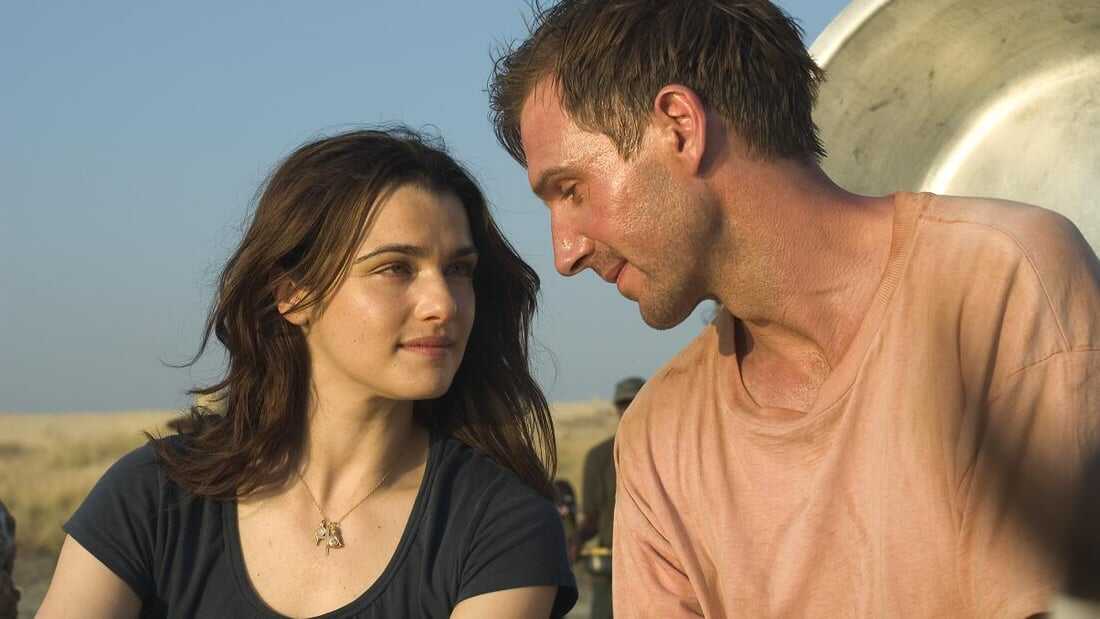
The Constant Gardener is a 2005 British-German political thriller film directed by Fernando Meirelles. The movie is based on the novel of the same name by John le Carré. The film tells the story of a British diplomat, Justin Quayle, whose activist wife, Tessa, is murdered while investigating a pharmaceutical company’s shady business practices in Kenya.
The movie follows Justin’s quest to uncover the truth behind her death, and in the process, he discovers the extent of the company’s corruption. The film received positive reviews from critics, and it was considered a powerful and thought-provoking political thriller that exposes the corruption and injustices that take place in Third World countries.
It won the Academy Award for Best Supporting Actress for Rachel Weisz’s portrayal of Tessa.
13. Black Panther (2018)
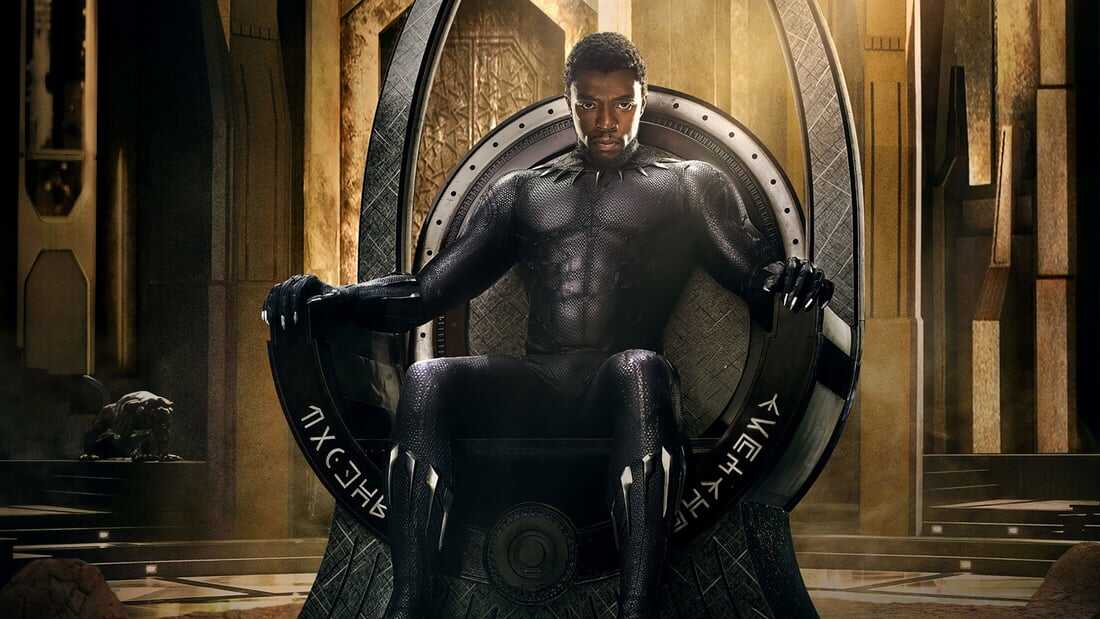
Black Panther is a 2018 American superhero film directed by Ryan Coogler. The movie is based on the Marvel Comics character of the same name. The film had a diverse cast that represented several African tribes and nations.
It tells the story of T’Challa, the newly crowned king of Wakanda, a technologically advanced African nation. He has to take the reign of the kingdom as the new king while also solving the murder case of his father, the former king.
The movie was a huge success both commercially and critically. It broke numerous box office records and became the highest-grossing film by a black director. The film was also considered a cultural landmark as it was the first major superhero film to feature a predominantly black cast and crew.
It has had a huge impact on audiences, particularly in the African American community, and it has been credited for increasing representation and diversity in Hollywood.
12. The Battle of Algiers (1966)
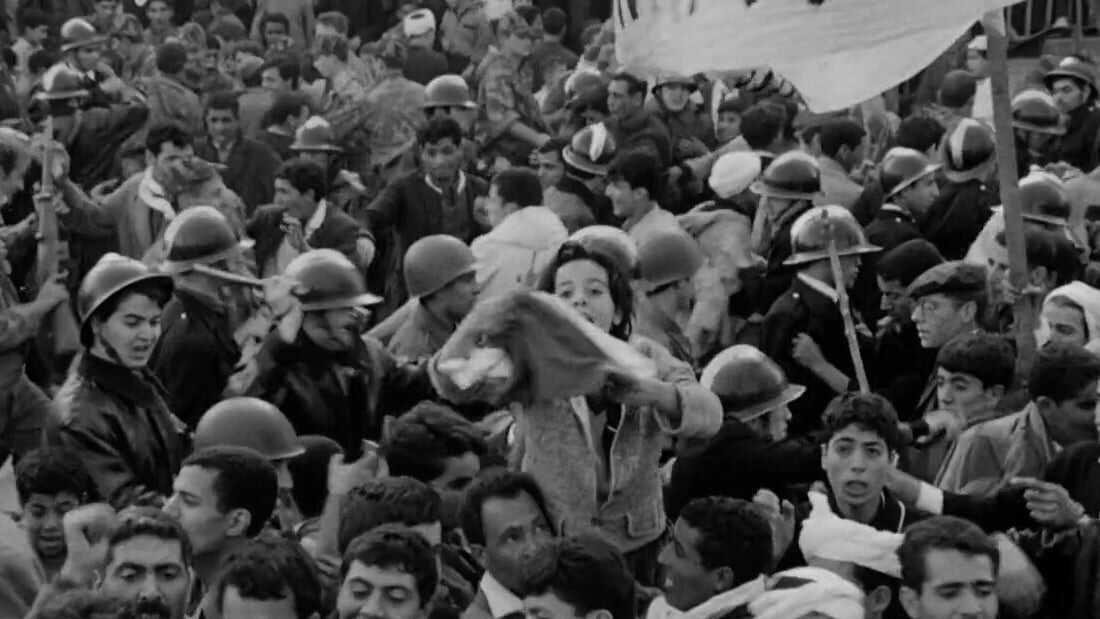
The Battle of Algiers is a 1966 Italian-Algerian historical war film directed by Gillo Pontecorvo. The movie is set in the 1950s during the Algerian War of Independence. It was critically acclaimed for its performances, direction, and attention to detail.
It tells the story of the fight between the Algerian National Liberation Front (FLN) against the French government in Algiers. The film is a portrayal of the revolution, the guerilla tactics used by the FLN, and the brutal counter-insurgency tactics used by the French army.
The film is considered a classic of world cinema, and it’s credited for its realistic and authentic portrayal of historical events and its impact on the people of Algiers. The film was also praised for its portrayal of the complex political, social, and cultural issues involved in the war.
It was nominated for several awards and won the Golden Lion award at the Venice Film Festival.
11. The Last King of Scotland (2006)
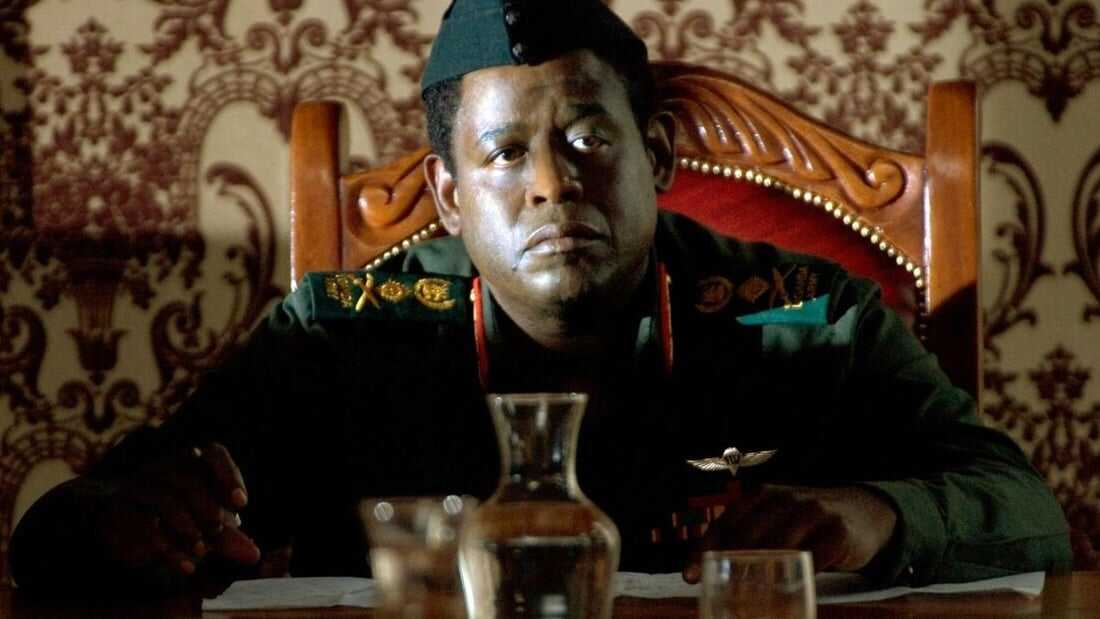
The Last King of Scotland is a 2006 British-German historical drama film directed by Kevin Macdonald. The movie is based on the novel of the same name by Giles Foden.
It was considered a powerful and disturbing portrayal of one of Africa’s most infamous dictators from the eyes of a fictional doctor. The film tells the story of a Scottish doctor, Nicholas Garrigan, who becomes the personal physician of Ugandan President Idi Amin.
We watch his descent into the dictator’s inner circle during the 1970s. The movie explores themes of power, manipulation, and the consequences of political ambition. The film was praised for its performances, particularly Forest Whitaker’s portrayal of Idi Amin.
The film won several awards, including an Academy Award for Best Actor for Forest Whitaker.
10. Camp de Thiaroye (1988)
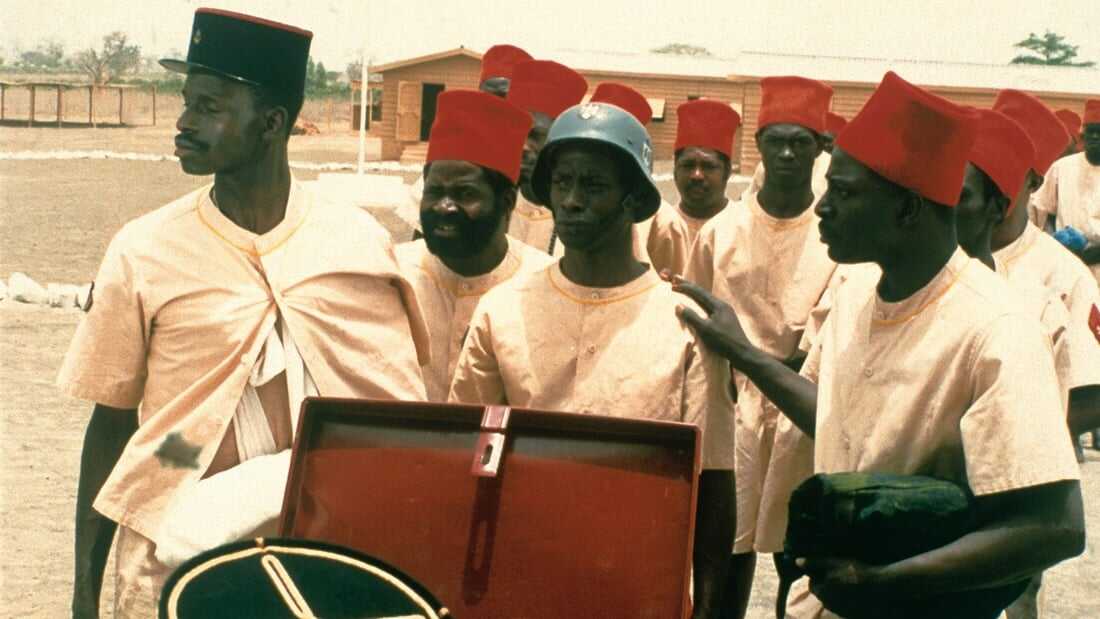
Camp de Thiaroye is a 1988 Senegalese film directed by Ousmane Sembène and Thierno Faty Sow. The movie is a historical drama set in 1944 and exposed the brutal treatment of the African soldiers fighting for the French at the hands of the French.
The film was banned in France for a decade. It tells the story of a group of African soldiers from various French colonies who were interned in a camp called Camp de Thiaroye after returning from fighting for France during World War II.
The soldiers soon realize that they are not being treated as heroes but instead as second-class citizens. They stage a peaceful protest for better treatment and fair pay, but it turns violent when French soldiers open fire on them.
The movie is considered a powerful and thought-provoking film that exposes the injustices and exploitation of colonial powers on their colonized subjects. The film received positive reviews from critics and won several awards, including the Special Prize of the Jury at the Venice Film Festival.
9. Asmaa (2011)
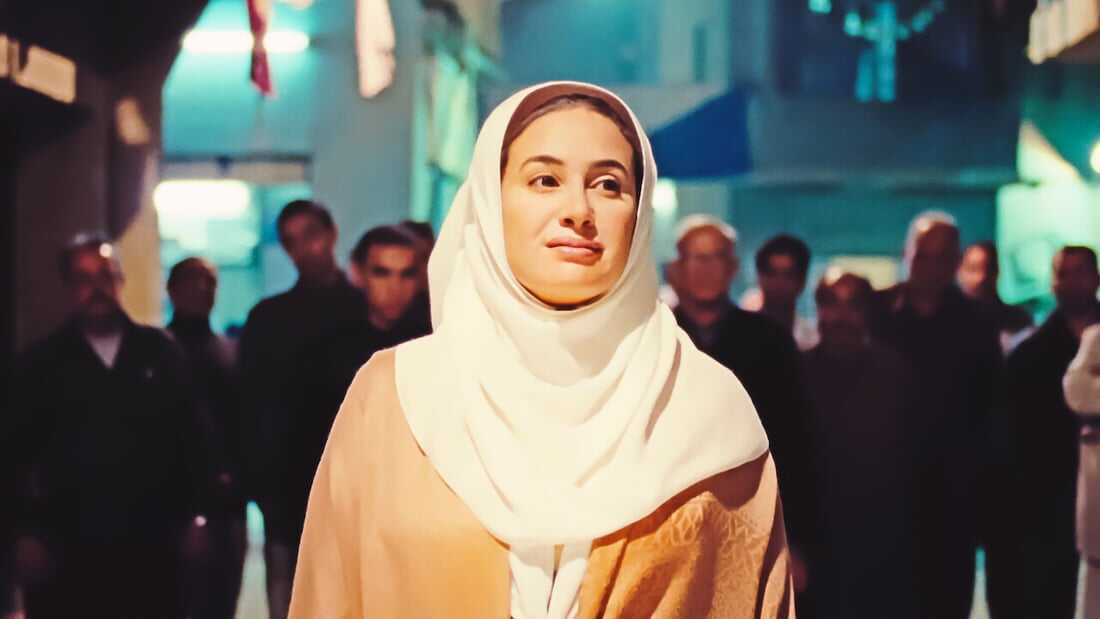
Asmaa is a 2011 Egyptian drama film directed by Amr Salama. It is partly inspired by the tragic story of an AIDS patient who died of a burst gallbladder after doctors refused to operate on her.
The film is not an AIDS-awareness movie but a story about the patients. The movie opens with the life of a middle-aged woman doing menial labor to support her daughter and aging father.
Through flashbacks, we see the story of Asmaa, a young woman living with HIV, and her struggle to overcome the social stigma associated with the disease. Asmaa is a strong and determined woman who despite her illness, fights to live her life to the fullest.
The film is considered a powerful and moving portrayal of the struggles of people living with HIV and the importance of understanding and acceptance. The film was well-received by critics and won several awards, including the Audience Award at the Dubai International Film Festival.
8. Zulu (1964)
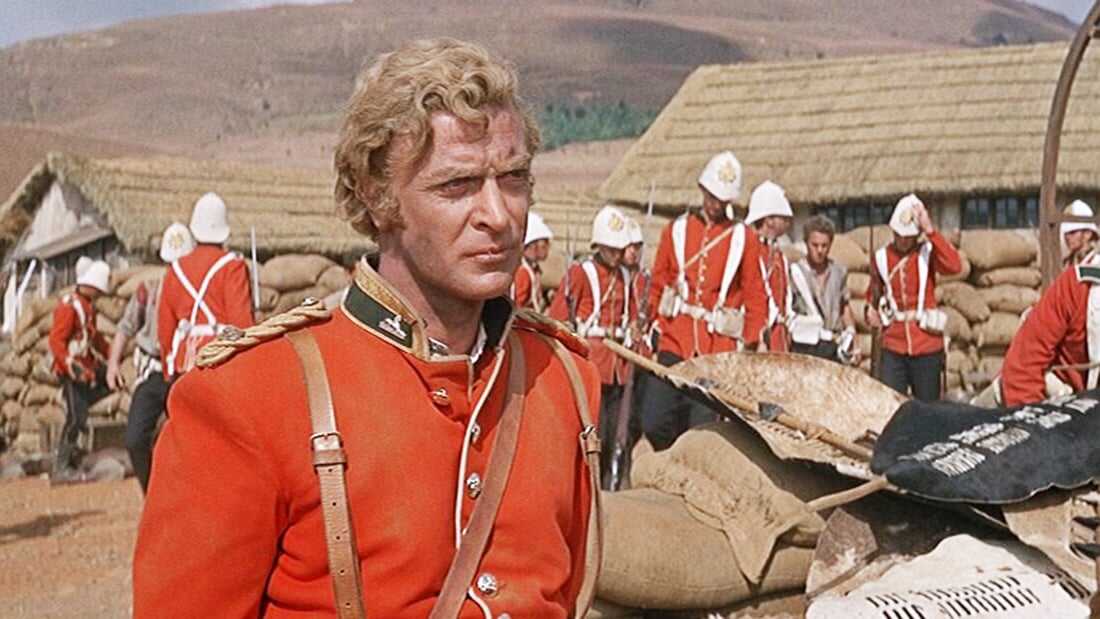
Zulu is a 1964 British war film directed by Cy Endfield. The film was successful in recreating the historical war and was praised for its attention to detail in its depiction of the Zulu culture and the battle scenes.
The movie is set in 1879 and tells the story of a company of British soldiers who defend the mission station of Rorke’s Drift against an overwhelming force of Zulu warriors during the Anglo-Zulu War.
The film was also considered an accurate representation of the historical events that took place during the Anglo-Zulu War. However, it was also criticized for its depiction of the Zulus as “savages”.
It lacks historical accuracy in the portrayal of certain events and characters. The movie was a box office success and was praised for its performances, particularly Michael Caine as Lieutenant Gonville Bromhead and Stanley Baker as Lieutenant John Chard.
7. Doa al Karawan (1959)
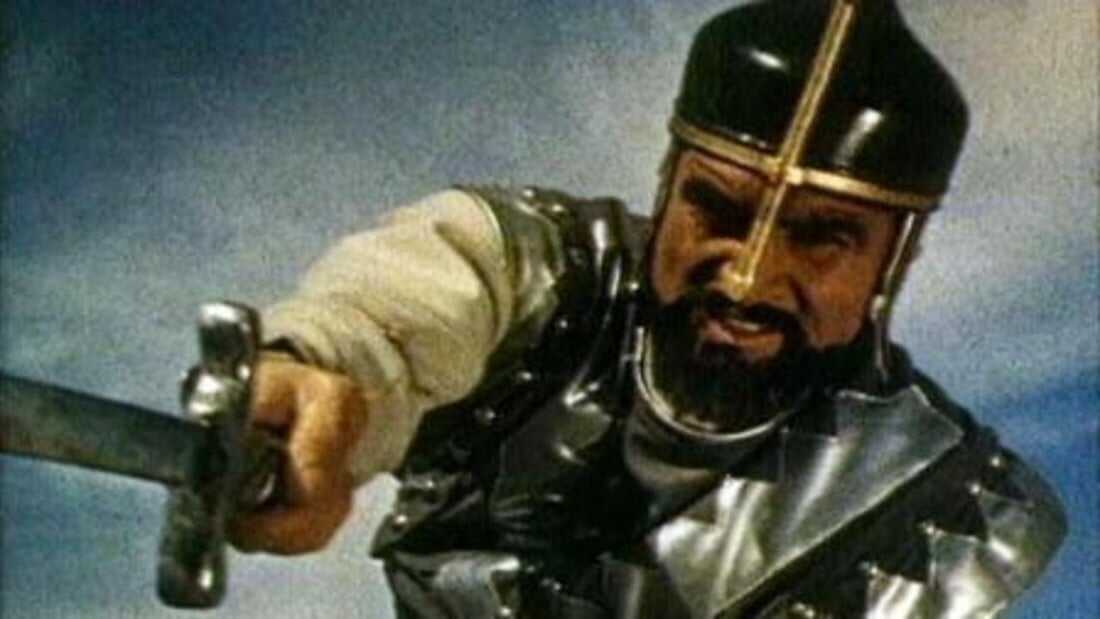
Doa al Karawan is an Egyptian film inspired by the novel of the same name by Taha Hussein. It was directed by Henry Barakat and was shown at the Berlin International Film Festival.
The film was given an award of recognition from the Academy of Motion Picture Arts and Sciences. The film revolves around the revenge of a young woman on an engineer who destroyed her family’s honor.
She plots to kill or poison the engineer on multiple occasions but fails to do so. As much as she tries to kill him, he starts to fall in love with her, and after an initial rejection, she too falls in love.
This complicates her plan for revenge. The film highlights themes of love, betrayal, family honor, false pride, etc., that can blind people from seeing the truth. The film received critical acclaim and praise from international audiences.
6. Captain Phillips (2013)
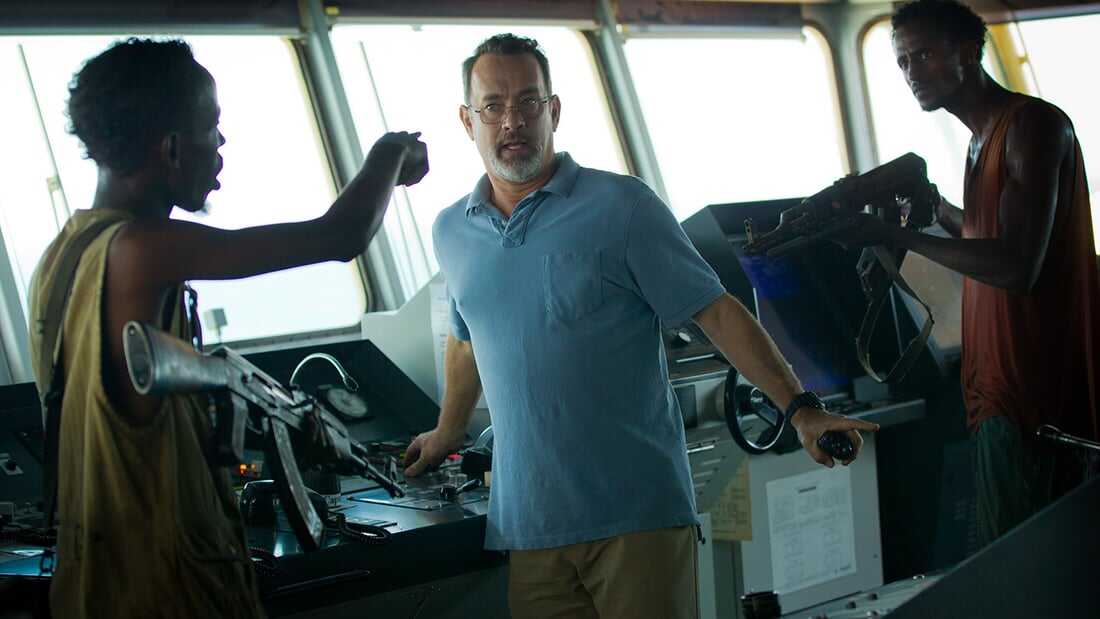
Captain Phillips is a 2013 American biographical survival thriller film directed by Paul Greengrass. The movie is based on the true story of the Maersk Alabama hijacking as recorded in the book A Captain’s Duty: Somali Pirates, Navy SEALs, and Dangerous Days at Sea written by Captain Richard Phillips.
The film enacts the incident in which a group of Somali pirates hijacked an American cargo ship, and its crew, including the ship’s captain, Richard Phillips. The film follows the story of the hijacking and Phillips’ attempts to keep himself and his crew safe while the U. S. Navy and the FBI mount a rescue operation.
The movie highlights the situation of modern-day pirates and the cause and effects of it. The film received widespread critical acclaim, and it was considered a powerful and suspenseful portrayal of the events that took place during the hijacking. The film was nominated for several awards and it won the BAFTA award for Best Adapted Screenplay.
5. Beautiful People (1974)
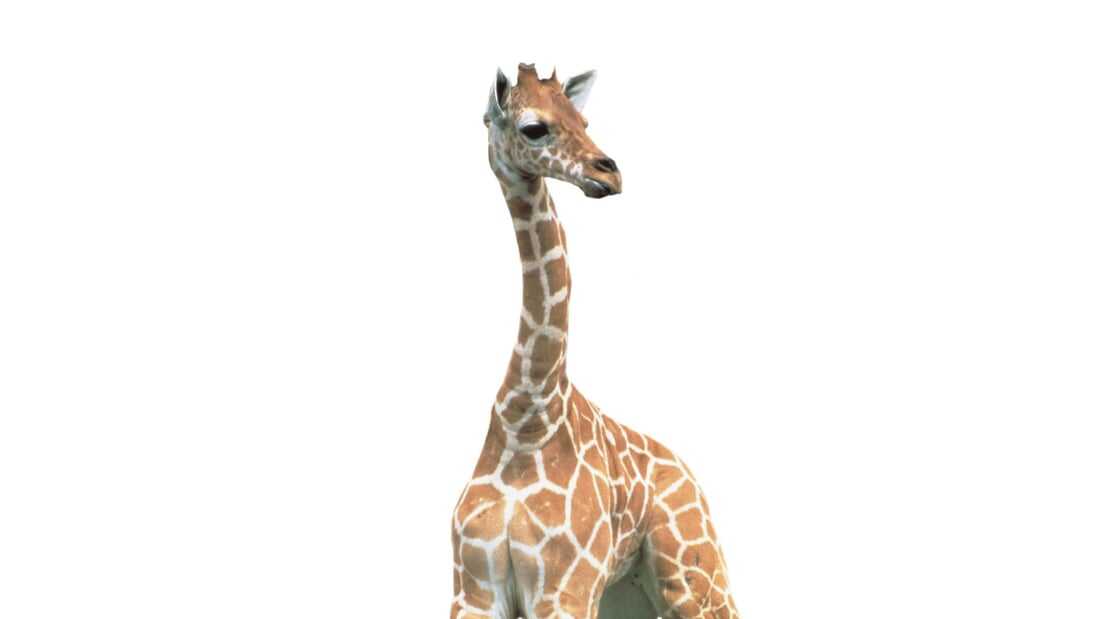
Beautiful People is a 1974 wildlife comedy documentary made by the South African writer and director Jamie Uys. The movie was released under the title Animals Are Beautiful People. It was filmed extensively in the Namib Desert, the Kalahari Desert, the Okavango River, and the Okavango Delta regions.
The film was shot over a period of three and a half years, and the director did not want any superstar involvement in the film. He refused the offer of Bob Hope to be the narrator.
He captured all the comedic moments. The scene where the weaver bird colony catches fire was staged, and the shot of birds scattering away spliced into it. The film won critical and commercial success for Jamie Uys.
He later made another African comedy film called Gods Must be Crazy, which became a film series. The film received a Golden Globe for Best Documentary Film.
4. District 9 (2009)
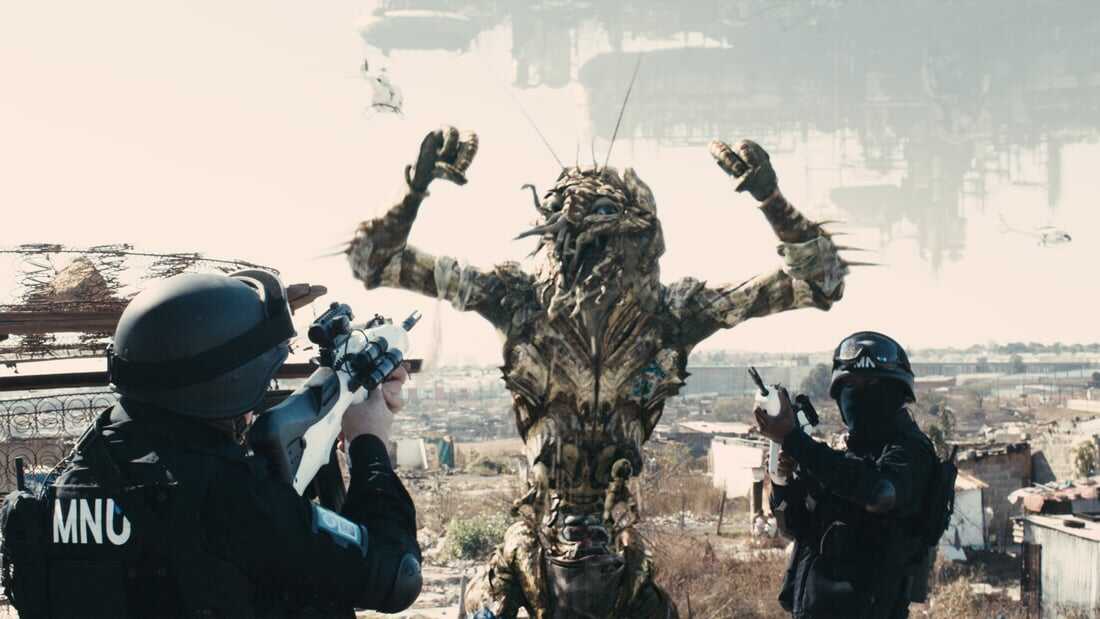
District 9 is a 2009 science fiction film directed by Neill Blomkamp. It was adapted from the short film Alive in JoBurg, also made by Neill Blomkamp. The racial segregation of District six during Apartheid was taken as a basis for the story.
The film is set in Johannesburg, South Africa, where an alien spaceship has landed. It carries a group of sick and malnourished aliens who are quickly quarantined into a slum called District 9.
The film follows the story of the alien race, known as the “prawns,” who have been stranded on Earth for over 20 years until a rebellion decides to escape to the home planet.
The film explores themes of segregation and xenophobia as well as the struggle for power and control. District 9 was a critical and commercial success, receiving numerous award nominations and earning over $210 million worldwide.
3. Searching for Sugar Man (2012)
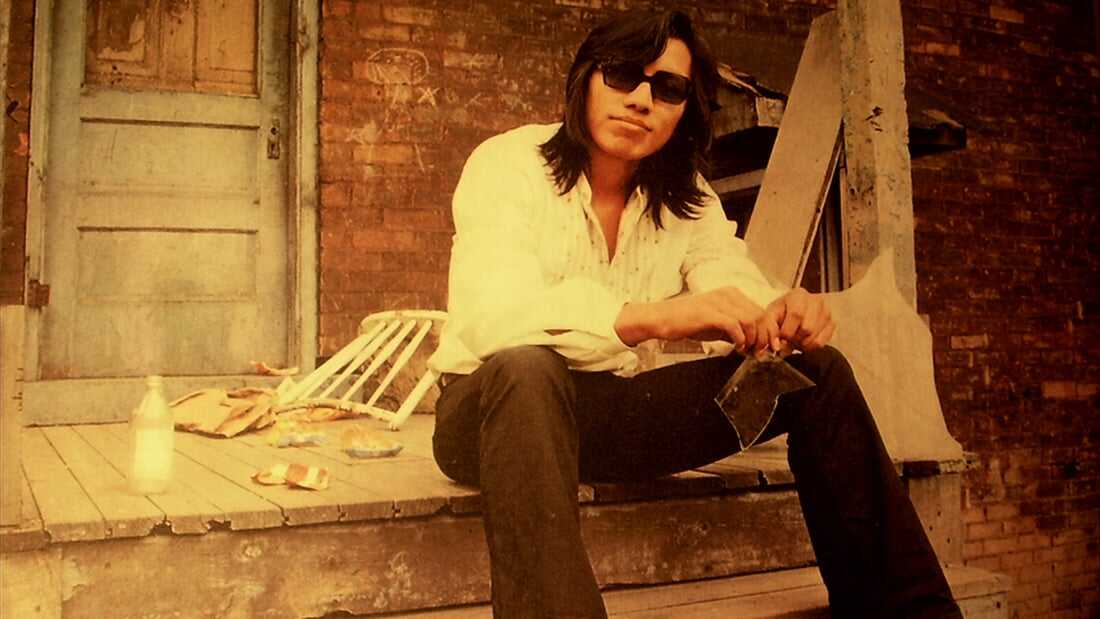
Searching for Sugar Man is a 2012 documentary film about the search for American musician Sixto Rodriguez who had become a cult figure in South Africa despite being relatively unknown in his home country.
Malik Bendjelloul, the filmmaker, made the film based on two South African fans of Rodriguez who set out to discover the truth behind the rumors of his death. They are unable to reconcile that their hero has died by suicide.
This begins a quest to debunk the rumors and bring him to perform in South Africa. The film explores themes of fame, identity, and the power of music. Searching for Sugar Man was a critical and commercial success, winning the Academy Award for Best Documentary Feature and grossing over $3 million worldwide.
2. Blood Diamond (2006)
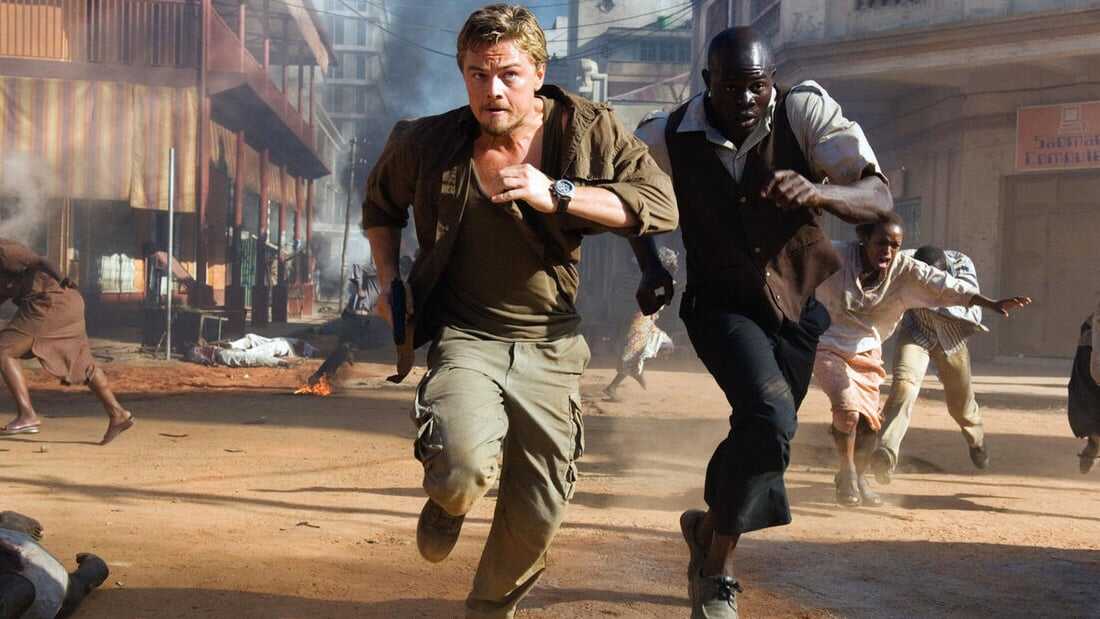
Blood Diamond is a 2006 political thriller film made by Edward Zwick. The movie is set during the Sierra Leone Civil War in the 1990s. We get to witness the unholy nexus between rebels, mining corporations, illegal arms dealers, and all the corrupt groups in a civil war situation.
The film follows the story of a Mende fisherman, Dia Vandy, whose family is torn apart by the conflict, and a smuggler, Danny Archer, who is searching for a rare pink diamond that will help him leave Africa.
The two men team up to find the diamond and escape the war together while being pursued by government soldiers and a ruthless diamond smuggler. The film explores themes of greed, corruption, and the human cost of the diamond trade.
It was a commercial success and received positive reviews from critics. Blood Diamond received five Oscar nominations, including for Best Actor and Best Supporting Actor.
1. Hotel Rwanda (2004)
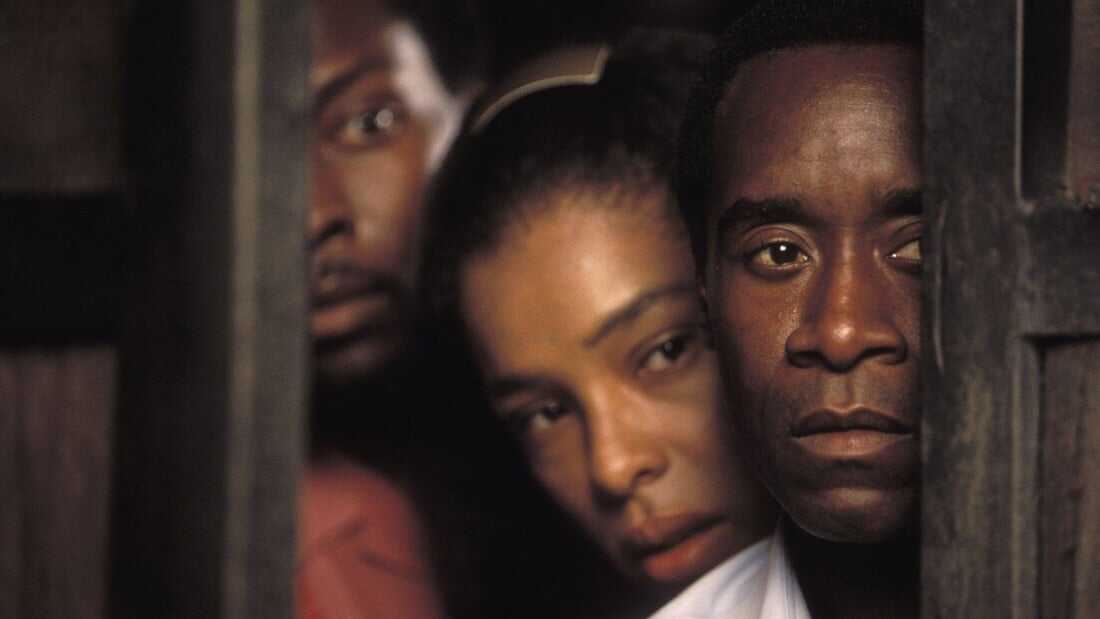
Hotel Rwanda is a 2004 historical drama film that tells the true story of Paul Rusesabagina, the manager of the Hôtel des Mille Collines in Kigali, Rwanda during the Rwandan genocide in 1994.
The movie follows Paul as he uses his hotel as a sanctuary for Tutsi refugees, including his family and friends while the Hutu government carries out a campaign of extermination against the Tutsi minority.
He uses his position and his relationships with both Hutu and Tutsi officials to protect and shelter over a thousand Tutsi refugees from the violence. He tries to negotiate with the Hutu power for the safety of his guests.
The film explores themes of heroism, survival, and the failure of the international community to intervene. It was well-received by critics and was nominated for several awards. The film was nominated for multiple awards including Oscar nominations.


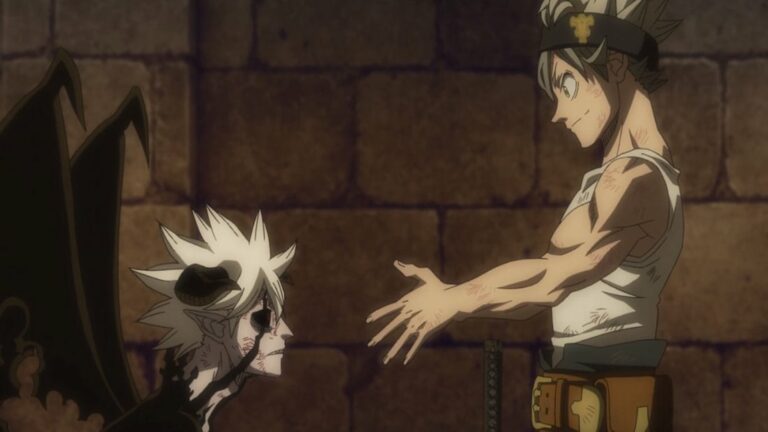
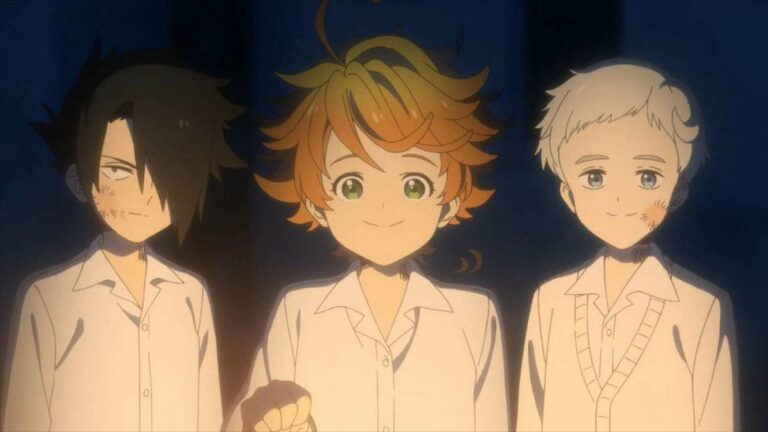
![My Hero Academia Movies Watch Order [Where To Watch]](https://www.entoin.com/images/muhy1-1-768x432.jpg)
